SettlingOut

Paul Gauguin: Ia Orana Maria (Hail Mary) (1891)
"I doubt that I could have not accomplished it without your presence."
Had I been watching the calendar over the last week, I could have prepared for today being the last day of Winter, but I was not watching. Distraction seems a great and glorious gift capable of producing pure magic. In those rare moments when I lift my head up from my work, I might catch glimpses of myself, but I've been spending the bulk of my days somewhere else. Our life here now seems as though it was holding us in suspension, as if we became an emulsion from which a SettlingOut seemed both inevitable and unlikely. Ten thousand and more elements had found their place here and we over time grew accustomed to the flavor. It started distinctly bitter but later turned sweet, then sour, never really settling on any one dominant profile. Now it turns savory, as the pieces which survived the over-long aging process finally start SettlingOut.
At the end of a meal, one settles up. Once arriving, one starts settling in.
HOAed

The Bauhaus emblem, designed by Oskar Schlemmer (adopted 1921)
"I'd prefer to inhabit The People's Republic Of These United States …"
The place we're exiting was built as a sort of latter-day attempt at Utopian development. Its developers sought to combine several conflicting conditions. Paradoxically, they intended to maintain original land use by leaving large swaths permanently open so that the buildings would not displace the native elk herd from its historical habitat. The developers also intended to build houses people could actually afford, so they built graded sizes, from condos to what we now call McMansions. The county and state land use laws never intended to govern such enterprises, Colorado having historically leaned toward the presumed right for any landowner to do whatever they damned well pleased on their property. The company adopted certain covenants and insisted that all inhabitants agree to abide by these as a condition of buying in. Later, a management company took over responsibility for collecting fees, maintaining public spaces, and assessing fines. These private agreements supplement the public law in this neighborhood, presumably for the common good, but as generations of decent people had already proven, no law ever adequately compensated for any absence of decency.
I have been free, for instance, to paint this house any of a half-dozen approved colors.
HollowingIn

Edward Hopper: Night in the Park, etching (1921)
"… this dance should properly continue into an eminently unforeseeable future."
When The Muse and I first stepped into this house, it was as spare and bare as a newborn baby, a blank canvas of a place devoid of distinguishing character. After weeks and weeks of stepping into places, some also blank canvasses and others over-crowded with leftover stories and others' possessions, this house seemed a welcome respite. It held nothing but potential then, other than its native dimensions, and even those seemed alien since we'd never lived in a house this new, for it was fewer than twenty years old. Our home place was nearly a hundred and ten by then, and we carried that certain distain for more modern construction. My eye caught the shoddy work mass production produces, the many shortcuts and compromises anyone building for profit incorporates into their latter-day masterpieces, yet the angles and high ceilings intrigued me. We might just be able to tolerate the shortcomings, which seemed slight after so very many deeply disappointing and genuinely disturbing viewings of places that clearly held no future for us. I'd about given up, suggesting that we might eke out an end of this exile existence in that tin can trailer park near her job. With an acquiescent sigh, I confided to The Muse that I could imagine myself living here, and she began negotiating.
Unthinkable now, in the current market, The Muse bid the owner down to precisely the price she wanted, the highest one we could possibly afford then, and to even the realtor's surprise, her bid was accepted.
GettingRealer
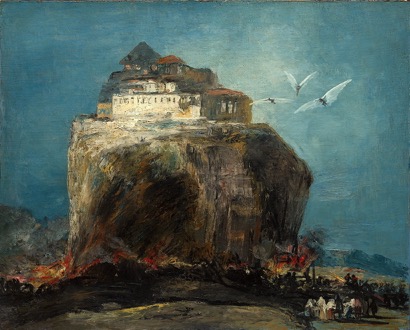
"A City on a Rock, long attributed to Goya, is now thought to have been painted by 19th-century artist Eugenio Lucas Velázquez. Elements of the painting appear to have been copied from autographed works by Goya, and the painting is therefore classified as a pastiche." Wikipedia
"About half of this stuff could evaporate without either of us ever missing it."
Things start GettingRealer when I put them into boxes. I classify—however temporally, however temporarily—creating definite descriptions, however actually misleading. I'm creating a Periodic Table of our Possessions, curious box fellows only intended to last through a brief transition, though I know for certain some of these items will never again see the light of any day. Apples and oranges easily fit into boxes intended for neither, my purpose more focused upon clearing shelves than in preserving any implicate order. In so doing, I disrupt what was once a definite order which eroded into a mild chaos over time. An expedient extraction or a hasty addition, The Muse respecting her notion of preserving coherence while walking all over mine, a thousand small diversions resulting in the mess I'm packing. About half of it disgusts me, kept in the pantry more so nobody could see it then because it carried any particular meaning or value. It's ours, we own it, and we can't quite bear to part with it during this time when we seem to be losing so very much. We'll drag that curious implement we never use lest we lose it in the transition. I imagine that I'll more easily part with it once I'm on the other side of HeadingHomeward. Real change, GettingRealer, demands much delusion.
Previous moves, the ones where The Muse's work picked up the tab, professional packers loaded our boxes.
Achilles'Finger

Donato Creti: The Education of Achilles by Chiron (1714)
"Older, yes, but still spitting."
I have to keep reminding myself that I'm not quite as young as I used to be, even though I never once have been younger than I used to be. Older than's a permanent condition. It connotes diminishing capability, though my present state finds me in much more able condition to engage in some activities than my younger self ever was. I remember a writer friend confiding some purported wisdom when we were both in our early twenties. He said that somebody insisted that no writer's worth a pint of warm spit until after they turn forty. We both silently set about to prove that proverb wrong and in the process, I guess, proved it to be correct. Nobody ever correctly anticipates how much better they might become and many, perhaps most, think themselves competent long before their mastery manifests. At my age, I really should have come to understand this principle, now that I'm well north of forty, but I probably haven't. I still engage as if I knew, when tomorrow will most likely disclose to me that I hadn't but that I might have mastered then. Mostly, a spiraling cycle of pseudo-certainly motivates me. I hope to never outgrow this capacity.
On Saturday, I engaged in an almost frenzied bout of dedicated packing. I went berserker on the chore.
Nowish

Wassily Kandinsky: Winter Landscape (1909)
"I swear I live unconscious …"
Packing, I feel least connected to the so-called here and now. Both here and now seem slippery, now that my focus has shifted toward HeadingHomeward. Now and here seem preternaturally tiny and unusually thin. Rooms fill with freshly filled boxes, leaving narrow aisles for navigation. The cats explore the ever-changing configuration, furry brows furrowing with apparent concern. The Muse still cannot quite believe that we'll be able to securely transport them for two driving days and an overnight, though we've begun researching feline face pheromones as a potential tranquilizer, anything to help ease the transition. The Muse and I seem to have mostly already arrived there, as if home was an app with a progress bar slowly moving left to right, revealing that we're about 80% loaded. Once we're there, we'll inhabit no more than moments, just like we always have here.
I'm the guy who was never certain what was happening around him.
CultYourWars

Wassily Kandinsky: Entwurf 2 zu Komposition VI (1913)
"You matter more than any us or them ever could have mattered."
The days are gone when culture amounted to holding eccentric skills like demonstrating the one true and proper way to cantilever a little finger when holding a fine china cup of Darjeeling. The only canting done these days involves twisting the common language out of shape for the purpose of demonstrating how ignorant another obviously is, each word purposefully loaded, each phrase most likely cast into meaning its opposite and said with a knowing sneer. We seem incapable of assuming the best of each other and so opt for presuming the worst. Another's not just wrong, but evil. I'm not just right, but righteous. Without my presence, this whole operation would have long ago gone to Hell without the benefit of hand baskets. I consider myself Heaven's Handmaiden, as you consider yourself, too, except your Heaven seems more like Hell, as mine must also seem to you. You're more than welcome to yours! I might be the only one left standing who actually qualifies to consider myself upstanding, everyone else, mere wannabes degrading civil society. Not even civility seems to be what it used to be, now seemingly more interested in trying to prove some essentially unprovable something than in letting anything or anyone simply be. Even culture itself seems to have gone to Hell.
Now we engage in wars about it, and not civil wars, either, but the most unimaginably uncivil ones.
Stalking

Gerrit van Honthorst: The Matchmaker (1625)
"How utterly unsurprising these continuing surprises seem."
My future takes care of itself in ordinary times, but this time seems somehow extraordinary. It's not every day, for instance, that I contemplate HeadwardHomeward in any way that might seriously threaten any present status quo. I've daily dreamed about heading in that direction for longer than the past decade without buying any packing boxes, until now. Now, I seem to have set into motion some irreversible actions very likely to propel The Muse and I somewhere different, somewhere familiar, and the forces seem increasingly inexorable. I won't be napping through this one. From one perspective, I have been actively stalking this very future for years, but from another perspective it seems more likely that this future has been Stalking me and has finally found me. This feels haunting, extra-volitional, as if it were happening to me more than that I might have been making this happen. The time has apparently come.
To complicate our exit, a Spring blizzard has been stalking us all week.
LastTripToKansas

R. Farrington Elwell: Untitled [Prairie Fire] (1935)
" … the threat of revisiting the wrong side of the tracks will leave right along with us."
Every city features two sides of the railroad tracks bisecting it, one side considered the right side of the tracks and the other, the wrong one. Denver's no different in this respect. Like most prairie towns, even those that never outgrew their founding footprint, railroad tracks slice right through the middle of the place. Denver's unique, though, in that the main body of the city's located on the wrong side of those tracks, at least from my perspective. I refer to that side of the city as Kansas, and I've made it my business to avoid it. It features most of what passes for culture here, which says something, and also hosts the state capitol, Union Station, and Rockies Stadium, but we became exurban once we'd moved into The Foothills. Kansas might have been only a half hour away by car, but between traffic and general inertia, we'd only rarely visit. We'd feel like we were Just Visiting, price tags still dangling from our hat brims as we attempted to navigate its ill-maintained streets. In January every year, they run a herd of Longhorns down through the business district to mark the opening of The Western Stock Show, the city's biggest cultural event. Need I say more?
As disappointing as urban Denver seems, the sprawling suburbia to the East seems several degrees worse.
Small_Distinctions
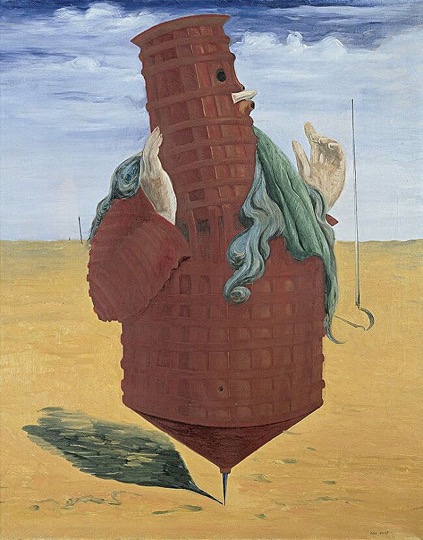
Max Ernst: Ubu Imperator (1923)
"Only a SmallDistinction separated their two identities …"
Despite, or perhaps because of, general exhortations for me to see the Big Picture, I usually focus upon making SmallDistinctions. Shades of grey seem to dominate most disagreements, not stark differences, as if a squint divided great armies to insist upon great tragedies. The easily perceived differences don't amount to much. The subtler ones seem to encourage deeper disagreements. Sons of Abraham became mortal enemies while birds and bees peacefully co-existed. BIG changes only seem the most significant, and some observers convincingly argue that BIG changes rarely, if ever, actually stick. People might take to wearing different jerseys but rarely shift far from wherever they started. One never successfully outgrows their roots, their infinitesimals growing up seem infinitely more significant. Blossoms might even emerge from those same gnarly, unpromising roots.
HeadingHomeward reduces into a series of small moments, none of them seemingly large enough to sum to anything wondrous or huge.
BoxingIn
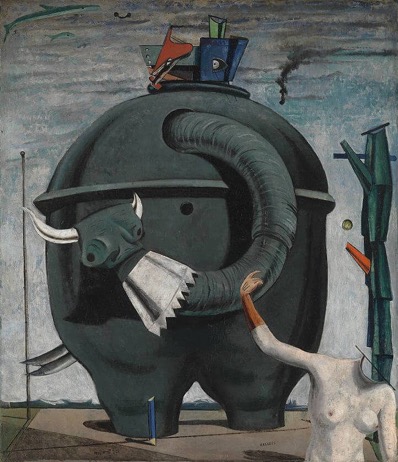
Max Ernst: The Elephant Celebes (1921)
"A point comes within every transformation …"
Two and a half weeks out, The Muse and I finally find a date certain for our departure, BoxingIn any possible escape. Procrastination no longer spins comforting yarns. With a suspected Monster snowstorm creeping in upon us, outside preparations should have already been completed and inside work might face a final bout of cabin fever before we can break camp and head into the sunset like they did in cowboy movies. My tendency to circle several times before boxing something can no longer sustain itself. I'm cornered and I can't deny what comes next. Where we formerly lived out of boxes, we're facing living within them, our lives suspended until after the move, and very likely for several weeks after we arrive.
Old Status Quos tend to hang onto themselves until just after the final responsible moment.
FreeShit
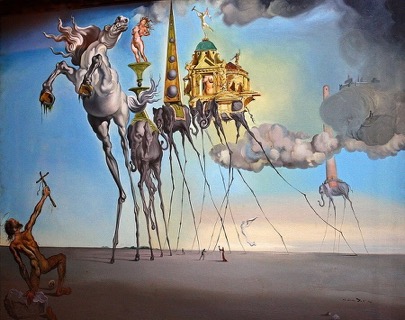
Salvador Dalí: The Temptation of St. Anthony (1946)
" … the sales price prominently displayed: Free."
The first place The Muse and I rented when we started our exile, sat on a street with a 25 degree slope. Too steep for the moving van to park there, so the driver parked on a flat spot a couple of blocks away and ferried stuff down to the house in a smaller van. One crew of movers would leave furniture and boxes on the sidewalk and another crew carried them inside, but the van crew moved much faster than the ground crew could, which left a pile of temporarily excess inventory on the sidewalk. Anyone who's lived in any American city could have predicted what happened next. I stepped out of the garage to find a car stopped next to the cache of boxes and someone pouring through one of them looking for FreeShit. The FreeShit Market remains an under-recognized portion of our much-vaunted free market system. In any city, anything left curbside becomes a free good. In Manhattan, for instance, the cost of moving furniture easily exceeds the fair market value of that furniture, so it's common practice to simply move that old couch out to the curb where it will be quickly scavenged or eventually hauled away as genuine trash. Most get snagged before garbage day. Finding these treasures tends to make someone's day.
The Muse and I have benefitted greatly from the FreeShit Market over the years and have come to understand FreeShit as somehow sacred.
LettingGo

Part of the Illustrated Sutra of Cause and Effect Handscroll (Emakimono) (E_NGA_KYO) (8th century)
" … LettingGo feels like giving up something."
LettingGo seems infinitely more difficult than acquiring, perhaps because the bulk of my training and experience has focused upon acquisition. I associate LettingGo with losing something rather than as an act of liberation. HeadingHomeward can seem, if I don't have my head screwed on straight enough, like dissension more than ascension, a falling into more than a rising up. I hail from The Never Can Say Goodbye Family, the one who, when stopping to visit, might linger longer than either party initially intended, stories lengthening into supper or bed time, seemingly unable to part, endlessly offering just one more story. Leaving subsequently seemed asymptotic more than specific, smearing along the leading edge, as if any leaving might somehow prove permanent, more terminal than temporary. My folks were kind of hoarders, holding on to keepsakes until they filled whole floors of their house. I was called to clean out the resulting mess after they'd spent their lifetimes failing to learn the gentle art of LettingGo. I learned everything and also nothing from them.
The New Agers insist that one must let go to let come, attempting to reframe the experience of losing into one of potential new acquisition, a making of space for different, perhaps even better.
FeelingLikeHome

The Villa Vatta Schmaltz, October 2019, the tenth year of exile
" … where it's best to just let that mystery be."
George asked, "What does FeelingLikeHome feel like?" I thought he'd either asked a brilliant or a snarky question. Doesn't everyone know what FeelingLikeHome feels like? Others on that Friday PureSchmaltz Zoom Chat amplified the question's brilliance. They didn't know either. Curious responses followed, ones, as someone—I think it was Steven or Cynthia—noted that FeelingLikeHome might belong to the same class of feelings as does falling in love, which I interpreted as meaning universally indescribable. I had always assumed that pretty much everyone naturally held a deep nostalgia for some physical place, a definite home base around which their life revolved, either there or away, a binary place in a world of stunning diversity, but I was about to learn better, "better" being disconcerting in this specific case. George opined that he held no particular sentiment about where he'd grown up. Steven said that he felt attached to the people in his home, not the physical place at all. Our dialogue turned curiouser and curiouser.
I tried, enlisting my situationally velvet tongue, thinking that I, if anyone, might provide a crisp description of the FeelingLikeHome feeling.
MultipleHomeTheory

Joaquín Torres García: "Constructivo en Gris y Negro con Centro Rojo"
"We exist beyond belief and confirmation …"
As a dedicated non-physicist, I feel great attraction to string theory, a perspective proposing that vibrating strings comprise the fundamental building blocks of this universe. As I understand it, which likely represents a material misunderstanding, under string theory, multiple simultaneous dimensions exist. I'm informed that the math supporting this perspective more or less works, though physical observation, long the gold standard of scientific investigation, cannot confirm it. I feel warmly attracted to this non-confirmation aspect of it because my experience seems to dwell simultaneously in multiple dimensions, and while my sensations fully support the existence of these swirling existences, physical confirmation remains beyond me. I can swear today without misrepresenting my experience that I continue to live in every home I ever inhabited, though I know that I physically left all but one of them behind me, or attempted to. This world would be even more of a mess if I could maintain multiple simultaneously active mailing addresses and the physical sciences would have to reject my MultipleHomeTheory or undermine its whole philosophy. In string theory, the math works. In mine, only personal sensations confirm it.
As we pack to leave this place, I face an impossible choice.
Snakes&Ladders

Bernardo Strozzi: St. Lawrence Distributing the Treasures of the Church (circa 1625)
" … maybe—just maybe—The Muse was counting cards again."
Board Games bore me. Trivial Pursuit seems aptly-enough named and begs a big "Why?" from my corner of the room. Sorry, likewise, seems properly, even preemptively labeled. Card games might show off some player's memory and observational talents, skills that seem to hold little relevance for me in my world. Though Fundamentalists might strongly disagree, I firmly believe that this universe operates quite skillfully by employing simple randomness, though I freely admit that this belief fails to produce the most compelling explanatory stories. Being human, most of us can concoct some fable revealing an underlying strategy or a subtle conspiracy holding everything together. Anything's better than the same old tale of random molecules disinterestingly bumping into each other, though the more exquisite stories insist that some God or other attends to even this tiniest level of detail. Bored Games, like religions, seem like attempts to fool ourselves for our own amusement.
Even the ancients found reason to amuse themselves by drawing clever conclusions based upon the results of rolling dice, a stunning paradox many might have missed.
ShortTiming
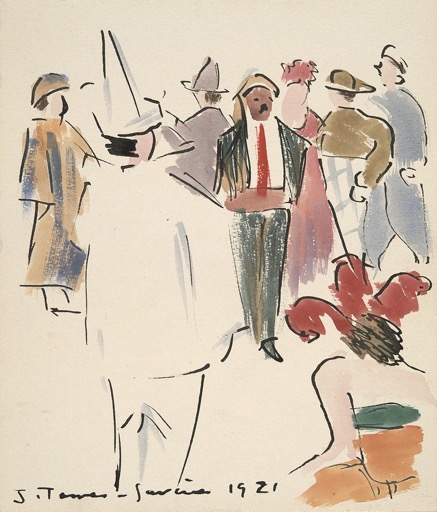
Joaqu’n Torres-Garc’a: Artists’ Ball: Pierrot and Figures Standing (1921)
" … grace seems so very far beyond knowing."
By our calculations, we're within a month of departing, that point where we actually begin HeadingHomeward rather than simply preparing for the passage. The actual Heading part of the endeavor will have shrunk into pinpoint significance by the time I finish this series, so much anticipating and so very little heading. We've slipped into the ShortTiming part of the program now. Long lead times, once the prominent feature, have shriveled into remarkably narrow ones. Everything seems to need to be done tomorrow, though something tends to delay everything in turn. I could be packing, but packing produces boxes which need storing. The clutter has metastasized into unseen annoyance which leaves me feeling itchy. The staging specialist, scheduled to show up at noon today, will doubtless further complicate the effort, probably insisting that even more schlepping seems indicated before we show the place to prospective buyers. The outside painters finished their work in under two days, a blinding speed when compared with my velocity. I'm moving at the approximate speed of a stunned horse.
ShortTiming sparks some superpowers, though. In sight of an end, many mysteries have resolved themselves.
Sleighted
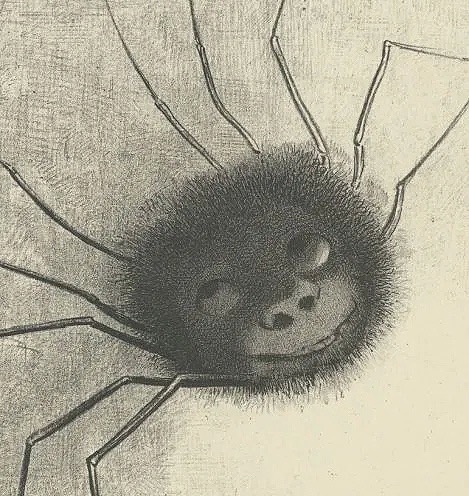
Odilon Redon: The spider, she smiles, her eyes look up (1881)
"Poison can displace purpose in any life."
I'm a sucker for spiders. Were I a fly, I'd have long ago been wrapped in web, sucked dry, and displayed like a trophy. I'm fortunately no fly, but I still seem to try to get along with the spiders in my life. Most, I just leave behind. Considering them trolls, I unfriend them and abandon any further attempt to tame or relate with them. Others, I cannot so blithely dispense with. They're dear friends of dear friends or, shudder, ex-spouses. These manage to corner me unaware, though I could argue that I should never let down my watchfulness when they're near. They must be out to get me because they always seem to catch me. I might enter an encounter hoping for better, but they dispense their worst, which they seemed to have been saving up just to bushwhack me with again. I've tried hardening my heart, holding deep suspicions as if they were reasoned conclusions, but I never seem able to maintain that stance. I let down my guard and they commence to have at me again, leaving me stunned and confused. Lucys snooker Charlie Browns again and again and again. I might be a Charlie Brown.
I come to learn that I committed a sin so grievous that it could never be forgiven.
Purging

Franz Marc: Yellow Cow (1911)
"I rid myself of my more troublesome priests …"
About a quarter of my worldly possessions probably qualify as junk. Precisely which items make up that quarter remains in shifting contention. HeadingHomeward brings a forced choice reckoning where I get to reconsider every blessed thing I own. I maintain my corners, shady spots I rarely peek into, places where I store my more embarrassing possessions. Many amount to regrettable purchases which I can explain to myself but to nobody else. I keep those well hidden, even from myself, because I cannot really justify their presence to anybody else, much less to myself. I'm embarrassed to own them but curiously have never gotten around to Purging them. I avert my eyes when in their presence, figuring that I might deserve to own them. They come to own me instead. HeadingHomeward calls a most curious sort of court into session. I get to fill the role of hanging judge.
I finally find the courage to engage in Purging.
SoftHearted

Hmayak Artsatpanyan, Sick Child (1900)
"I'm still pondering the present he left behind."
I think of myself as a Soft-Hearted SOB. This characteristic usually manifests as a tenacious unoffendableness, which means that I don't often say if you've offended me. I'll widen the gap between us instead. If you've royally pissed me off, you might never hear from me again, but I rarely say anything as I exit. Perhaps my response springs from my begrudging understanding that I'm nobody's reformer. I live and let live without trying too awfully hard to get everything to line up according to my sense of order. I notice but stay mute.
I rarely witness my temper boiling over.
MistMeals

George Frederic Watts: Love and Death (c.1885–7)
"HeadingHomeward seems an extended trance …"
Many activities carry some specific marker which somehow signifies their presence. These markers vary widely and often revolve around a specific food served as a part of some celebration, though many everyday activities carry markers, too. In The South, for instance, a simmering pot of Hoppin' John, a vile concoction served for good luck, screams New Years. Some families invite ham to their Thanksgiving table while others observe the day with turkey, refusing any substitutes. "It just wouldn't seem like Thanksgiving without a bird." A lunchbox packed on the kitchen counter served as one sure marker that my father was heading to work that morning. Bag lunches served as a similar indicator that us kids would be heading for school. Some activities, though, carry no such marker, and I speak of those this morning.
The Muse and I tend to find ourselves so deeply engaged in some classes of activities that we quite literally forget to eat.
Reprospective

Thomas Cole: The Voyage of Life: Manhood (1842)
"I'm not even my own exemplar of how I should be living."
My life moves both too slowly and too quickly for me to in any way accurately experience it. In any moment, I'm very likely too present to perceive deeper meanings. Later, tearing myself away from focusing upon any present moment will likely distract me from perceiving whatever's going on around me then. I inhabit an endless swirl of impressions struggling to impart their significance. I live superficially by default, apparently incapable of fully inhabiting any fleeting moment and also struggling to wrest any deeper meaning in retrospect. I live Reprospectively, repossessing past experiences with my writing, with the expressed purpose that I might thereby more adequately prepare myself for what might be coming next. I seek patterns in my otherwise apparently random experiencing, hopeful that useful, maybe soothing stories might emerge, hopeful that I might have been there in lieu of ever actually being anywhere in any moment. I do not fancy that my experience differs very much from anyone else's. My meanings only ever emerge well after any fact and my facts remain at best questionable. My life might have been completely fictional. I cannot tell.
I employ my Friday mornings to focus myself upon attempting to make sense of each receding week's writing.
JabberWonky

E.-E. Hillemacher: Edward Jenner vaccinating a boy. (1884)
" … what an overlong and terribly strange trip it had been."
Certain lines—queues, really—induce a deep sense of belonging, of being a member in good standing of a clearly upstanding society. For me, my first memory of standing in such a line came circa nineteen fifty-something when my whole birth family queued up to receive the Salk vaccine against polio. The whole Pioneer Junior High School Gymnasium crawled with organized humanity. We must have looked like refugees or something, fleeing from some catastrophe, and maybe we were precisely that. Everyone knew someone touched by polio and all were eager to see that they weren't victim to that tragedy, so everyone, even five or six-year old me, enthusiastically lined up and swallowed the proffered over-sweet Kool-aid shot. We had been background afraid forever and this sugar water offered hope for genuine salvation. Further, I felt even then that I was committing an authentically patriotic act, not just for my country or some ethereal God, but for humanity. I for the first time felt a sense of what I'd later learn to call solidarity in my chest, very near my heart, a first-class member of my community at last!
I've had similar twinges since when enqueued for voting or when openly protesting against some injustice our government had been committing, but that was my first taste of that kind of freedom, the liberty only felt when freely volunteering to become one of many like minds coming together to accomplish something stunning.
ResidentAlien

Paul Klee: Cold City (1921)
"I only ever knew for sure that I didn't seem to really belong there."
Having spent the bulk of my life living as a ResidentAlien, the prospect of HeadingHomeward unsettles me. You see, as a ResidentAlien, I enjoyed certain freedoms open to nobody native born, though most of these freedoms amounted to Get Out Of Jail Free passes exempting their holder from feeling obligated to engage in what I might call civic life. Because the ResidentAlien holds no history to their adopted home, many local interests hold little attraction. Routine celebrations—fairs, parades, various galas— seem tightly focused upon parochial perspectives. Those holding Just Visiting status couldn't care less about the local founding fathers. Here in Golden, Colorado, for instance, Buffalo Bill Cody's memory remains revered in spite of his checkered career as a mass murderer of buffalo and a film flam man extraordinaire. The Muse and I have managed to miss the city's annual celebration in his honor, though we did out of curiosity once visit his grave which overlooks the region from atop the first tier of foothills. We were not moved by the experience.
Over the past twelve years, The Muse and I have been inhabiting more than living, for we've stayed in places where we almost never ran into anyone we knew when we went to the grocery story.
Plausabling

Egon Schiele: Portrait of Wally (1912)
"Opportunity rarely knocks. It generally slips in unseen …"
Managing—even participating—in any project seems like a process continually wrestling with plausibility, but these efforts at best qualify as processes in name only, only distantly authentic. Certainly, one produces plans and lists of activities, but neither of these end up executing precisely as projected. Stuff happens and participants adapt. They then engage in a sort of self-deception to prevent an overwhelming sense of chaos from overtaking. Many of these self-deceptions amount to post-hoc explanations of how whatever happened improved the presumed process. Others describe how fate or something had apparently taken the effort under its wing to provide unrequested guidance and often even far greater wisdom than the original plans had provided. Most of this explaining occurs preconsciously, the conclusions seeming obvious to anyone watching. The auditors typically expect somewhat more detailed justification for swaying away from original projections, and their insistences encourage the production of some of the greatest fictions ever produced about anything.
Projects, you see, remain in a continual state of Plausabling, taking advantage of a curious human capability to ever more fully justify almost anything.
Lye-ing
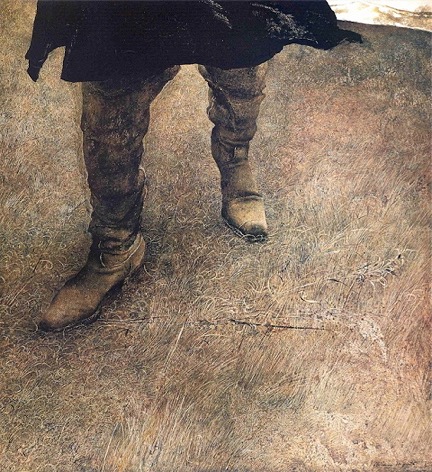
Andrew Wyeth, Trodden Weed (1951)
Oh, what a tangled web we weave,/ When first we practise to deceive! - Sir Walter Scott: Marmion, Canto 6, stanza 17
"Am I dreaming?"
I no more speak in absolute truths than I speak in iambic pentameter. I ain't no Shakespeare but I retain a voice and I use it. I work hard to avoid abusing my voice. I attempt to approximate truths I cannot absolutely prove while avoiding passing on misrepresentations, even when these acts might threaten my position, whatever that is. I ain't no politician, either. I studied advertising in school, and that exposure convinced me against choosing a career in the since-burgeoning propaganda industry. I still struggle to promote myself, firmly believing that my good intentions might chase out others' bad. I'm consequently a lousy competitor. I'm not anybody's 'better than sliced bread' innovator. Commercial bluster attempts to balance information and persuasion to convince skeptical buyers to let down their guard for a minute, but once the meme enters, there's never any effective means for undoing it. I might seem naive, but I, most days, manage to bear living with myself. Some substances effectively replace the benign with the poisonous such that one grows to lose their ability to live without their poison, and lying works precisely like this. Once a false premise gains dominance, it costs Hell's own expense to escape. Some barking damages far worse than most bites.
The society we inhabit has swallowed plenty of rubber worms, often without obvious remorse.
Unexceptionalism

Caravaggio: Saint Jerome Writing (1608)
" … seek not dominion but authentic communion."
The most exceptional aspect of being human seems to be just how Unexceptional each individual seems. Many of us seem convinced that we're somehow exempt from the messier elements of The Human Condition while none of us ever actually prove to be. We each seem prey to curious vanities but also victim to puzzling inanities. We might think we're special and also feel easily wounded by even casual, uninformed criticism. The best and brightest among us seem especially cursed while the average guy, as if such a creature exists, avoids much controversy and seems to cruise through life. The price of notoriety seems to be a focused infamy as every vanity seems destined to be brought to light and eventually vilified. Most saints were martyred. Many innocents get slaughtered. The great face precisely the same fate as everyone else. Posthumous statuary settles nothing.
I wonder whether I'm good enough and no proof ever seems adequate to decide my question.
Okaying

Portrait of Saint Peter Claver in the museum Palace of Inquisition, Cartagena, Colombia
"What else could there possibly be to say?"
It's common practice in this culture, following the death of another's close family member, to ask a fundamentally unanswerable question as both an acknowledgement of another's loss and to serve as comforting solace. "How ya doin'?" seems the most common fundamentally unanswerable question offered at these times. The bereaved, then, either through prior practice or by common example almost always responds with the universally acceptable answer, by which I mean they offer a meek, "Okay." Of course, the bereaved does not usually feel anything in any way like Okay, but the response serves greater purpose than an accurate status update, for Okay works as few responses ever could. Delivered under this condition, it induces a trance which allows the receiver to translate it into whatever meaning they'd hoped their inquiry might elicit, thereby satisfying both the bereaved as well as the inquisitor. This exchange works like magic every time and proves much more reliable than any so-called more accurate response.
The asker didn't really want to know how the griever felt.
Vacating
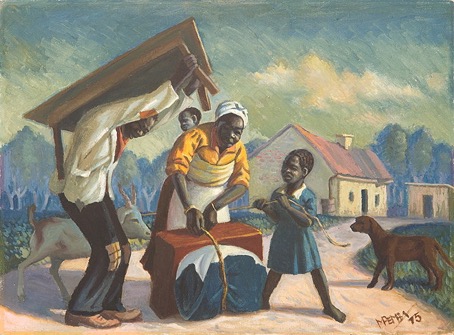
Trek: George Pemba (1975)
" … the grace to forgive ourselves for what we knew not what we did."
HeadingHomeward, unsurprisingly, turns out to be a process, and a prolonged one comprised of semi-sequential stages: Aspiring, Planning, Refurbishing, Packing, and today's focus, Vacating. Vacating features both a long nose and an even longer tail. It begins way back in the Aspiring stage when we struggle to envision the place without our presence, an utter impossibility we innocently assumed responsibility for achieving. Of course we failed to satisfy that expectation, it requiring us to see into negative space, but we seemingly had to exert some effort toward accomplishing it, if only for form's sake. I aspire to achieve a clean exit even though I suspects that nobody ever actually achieves this. Still, stewardship insists that we at least attempt to make peace with our eventual absence. Yes, we conclude, this place might just be able to exist without our presence, though we can never quite imagine how. Each stage of HeadingHomeward seems destined to further humble us into acceptance.
I suspect, based upon prior experience, that Vacating here will turn out to be a prolonged affair, probably an eternal one.
RoughingIt

Thomas Cole: Romantic Landscape with Ruined Tower (1832–36)
" … what we call suffering, they would have experienced as pure luxury."
My Five Times Great Grandfather and his new bride headed West in an oxcart for what was then the Iowa Territory from what is now Southeast Ohio, circa 1810. He lost his bride when she fell off a ferry crossing an ice-choked Mississippi River. He arrived alone in his adopted home. I can't compare our situations. We've just lost use of the kitchen for a few days, but I admit to deeply feeling the inconvenience. I just finished clearing a path through about a foot of powdery snow to access the grill, where I set a pot of water on to boil for The Muse's morning coffee. Last night, I heated a pot of beans on that grill while swirling snow speckled my hair. I figure it's an adventure not requiring us to venture from home, though the box-cluttered interior seems almost entirely unlike home right now. We might have unconsciously set about undermining our sense of place when we conspired to change locations, the repainting just a part of a wiser puzzle. More indignities lie ahead, I'm sure, just as sure that I'll faunch at experiencing each and every one of them. I miss my space.
My boots seem too large for my feet, for I keep catching them on errant clutter whenever I attempt to navigate this newly-constricted space.
DistRaction

Pablo Picasso: Weeping Woman (1937)
"I most fear any sense that I might prove myself the master of this experience rather than its unwilling apprentice"
Say what you will about focus, but I come today to sing the praises of DistRaction as one of the more under appreciated treatments for serious distress. They might insist that one must eventually face trauma head on and fully integrate its lessons, but reckoning need not occur immediately or necessarily permanently. It's not chicken shit to sit a spell with an upset, nor does it necessarily qualify as dysfunctional to defer dealing with it until some seemingly more convenient time. Some integrations seem to need some aging before they can be savored. Others come without handles and simply cannot be grasped at first. Under these and many other conditions, a decent DistRaction becomes a godsend. The form of DistRaction probably doesn't matter, at least not at first. A binge-watch equals a good book, a previously-scheduled commitment serves just as well as sudden snow squall, anything at all capable of drawing away full attention for a while might work.
The Muse and I and her visiting sister Donna are living out of boxes this week.
WhiteElephants
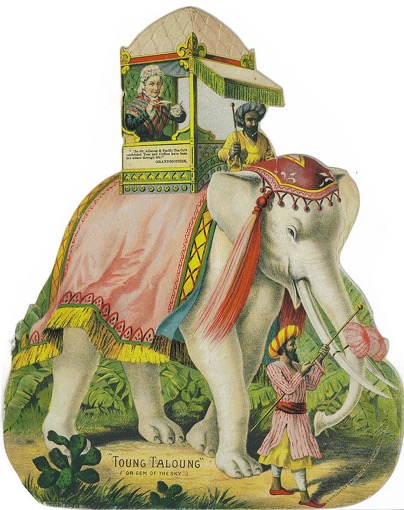
The Great Atlantic and Pacific Tea Company advertisement, featuring P. T. Barnum's WhiteElephant Toung Taloung. (Circa 1885)
" … probable salvation to certain damnation in an instant of sober consideration."
While packing up the contents of her two towering china cabinets, The Muse was not surprised to find a few WhiteElephants hiding within them. Each WhiteElephant was once considered a unique and somewhat sacred beast but had somehow lost its context over the time since acquisition, to become a glaringly unique item in an increasingly homogenous collection. Each no longer seemed to belong. What she might have originally acquired as a unique, one-of-a-kind item, she would dispose of for essentially the same reason. The thrill attending original discovery dispersed over the intervening centuries to produce a genuine oddity no longer belonging within our zoo. How each came to this ignoble end seems unimportant, but as we pack up for HeadingHomeward, we're throwing off a surprising volume of once semi-sacred stuff.
I returned from my yesterday morning's run to the Goodwill Donation Center to report a casualty.
AbSensation
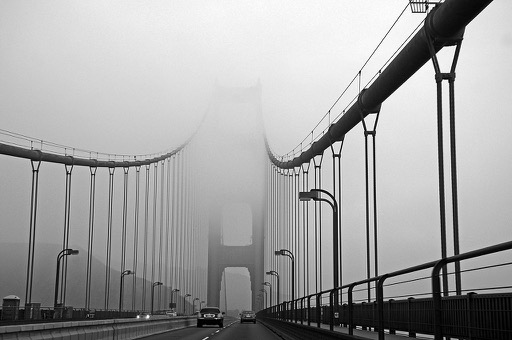
Unattributed: Fog On The Golden Gate Bridge (Free public download image)
"AbSensations might be the means by which one adjusts to absences."
Which of the five primary senses seems most powerful to you? Sight? Hearing? Taste? Smell? Touch? Many of us feel attracted to one over the others. I know myself to prefer auditory input, though I cannot stand to attend loud concerts which seem to abuse the privilege sound imparts. The Muse seems much more visually sensitive than I. She's likely to see stuff I pass by without noticing. I used to, when teaching workshops, sit in the back of the room with my eyes closed so that I could better 'see' what was happening during exercises. I mostly see with my ears, it seems. The Muse can taste flavors I cannot register. Senses serve as definite discriminators, better determining differences than almost any other measurement. For my money, though, I've concluded that the AbSensation proves the most dependably powerful.
The AbSensation, that sensation allowing us to sense an absence, seems most present, though it seems as though it exclusively trades in stuff none of the five primary senses can touch.
DisAssemblage
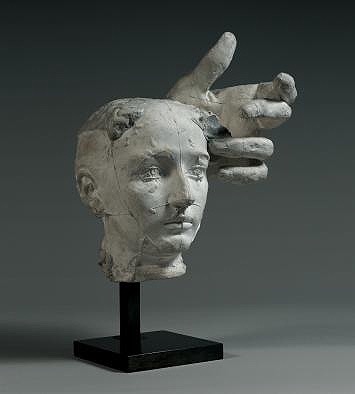
Auguste Rodin: ASSEMBLAGE: MASK OF CAMILLE CLAUDEL AND LEFT HAND OF PIERRE DE WISSANT (Circa 1895)
"I will first view her art in the moment of its destruction …"
The Muse spent the day wrapping and packing 'her' dishes, emptying the two towering china cabinets, disassembling, engaging in an art form perhaps properly called DisAssemblage. Much dissembling accompanied her work, for it demanded that she at least act grown up and dedicate herself to creating an inevitably short-lived result. A few short weeks from now, she'll be disassembling her DisAssemblage to repopulate her two towering china cabinets, flattening sheets of packing paper to be passed on for someone else's DisAssemblage effort. Still, she dedicated herself to proper technique, trusting no one else's eye to protect her treasures, each piece lovingly placed within sealed boxes, an unseen result nonetheless steadfastly produced. We will pray for careful movers and safe storage for these treasured pieces of unseen artwork.
There are unwritten rules for creating such fleetingly-seen artworks.
Inalienable
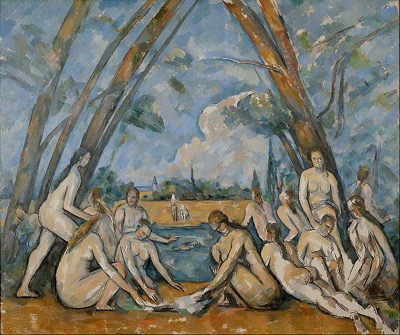
Paul Cézanne: The Large Bathers (1898–1905)
"I … prefer to avoid the sure and certain knowledge that I was the one who lost it."
I don't much care about my formal so-called Inalienable rights. The right to bear arms seems about as useful as a right to wear mismatched socks, nothing that won't disclose more than anyone really wants to know about me should I exercise it. The freedom of religion seems less useful than might a freedom from religion, evangelism being one of the more prominent banes of civil society. Nobody needs to save me. The Inalienable rights I care about seem more fundamental than political, more personal than social. I mostly enjoy the Inalienable right to move around my home without having to think very much about what I'm doing. I revere the ready-to-hand, the quirky semi-secret storage spot where I keep my rubber band supply and the place where the toothpicks hide. My world features thousands of such secure stocks to which only I hold the map. Packing disrupts every one of these.
It might seem a simple matter to clean out a closet.
JourneyManning
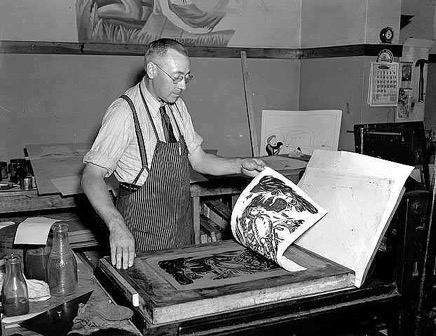
WPA Federal Art Project, 1935–1943: Lithographer at Work (1938)
"Dreams come true not by merely dreaming but by finally waking up."
Begin by going out of your mind. Leave all sense-making behind. Imagine a point in space and time, then focus attention there until the present and all the distance between now and then including the here and now seems to disappear. NowHere becomes nowhere. ThereThen becomes The New Beginning, and everything before, preamble. Arriving there becomes The Purpose; the journey, mere annoyance. 'Are we there yet?' becomes the mantra for existence, one you might just as well be absent from since you're living for a future divorced from this past, your present. Clearly not yet having mastered living, you're still striving beyond your reach instead. What poisonous thoughts have invaded your head that you imagine you might master anything in absentia? Mastering anything seems to demand mostly JourneyManning, which, with luck, might result in producing just an instant of apparent mastery near the end. It was not the master of any future who crafted those results, but the tedious JourneyManning all along the way. Later, after the world no longer holds any need for a more alluring future, then a master might emerge for recognition and appreciation. Until then, it's all local navigation, grunt work, and aggravation. One must master feeling put-upon first. Rest and laurels might follow later.
I used to teach a course I titled Mastering Projects Workshop. I should have called it JourneyManning Projects Workshop
Displacement

A 16th century woodcut of Archimedes' eureka moment.
"I hope we'll find some of our selves imbedded within whatever emerges next."
When I say I'm HeadingHomeward, I put myself in danger of misrepresenting my movement, as if I was passing through passively empty space when I might more properly speak of Displacement. We exit having visited disruption upon our accustomed routines and threatening worse on the other end, for this world, our world, remains tightly connected and any change anywhere transmits shockwaves and worse throughout the system. There are no innocent or isolated actions except through willful inattention, and even that wears thin and insubstantial. A realtor innocently suggested that we update the interior color of The Villa before we leave, which set up a grand Displacement well before we'd actually be Heading anywhere else. Rooms emptied of evidence of our long occupation have been hollowing out what remains of our existence, rendering some days unbearable, or nearly. Privacy has become a premium commodity with the second floor swarming with painters, their tools, and supplies. We're masked to pass through our own house and we sleep surrounded by tarps and paint smells.
Molly and Maximum, our trusty cats, maintain the rhythm of this place, or try to.
Wounding

Thomas Cole: Prometheus Bound (1847)
"Be fierce in your acceptance to learn intended lessons."
Wounds seem delicate but also intelligent. They mostly heal themselves for if they cannot, they might well prove fatal. They usually need acknowledgement more than they need treatment, lest they inadvertently be left to fester. They often need isolation, a quarantine, if only a bandage, and a bandage infrequently checked. Constant scrutiny becomes the enemy of recovery. Time cannot heal all wounds, but the ones that do heal always require patience, often more than the aptly-named patient feels capable of providing. Some distraction helps, anything capable of directing the worrying mind away from attending, because wounds need little attention. Nattering over them never encourages healing, though most do not benefit from neglect. They might demand respect, acceptance that you're ailing without insisting upon becoming permanently disabled. They heal or they don't, but the world will not snap back to the way it was beforehand. Better to project a progression than fall into abject depression about the change. Shit happens and then we heal. Well is a relative state.
Wounds seem wiser than any patient suspects, and even doctors and nurses learn to respect their inherent wisdom.
Schlep

Titian: Sisyphus (Circa 1547-48)
"In Greek mythology Sisyphus or Sisyphos was the king of Ephyra. He was punished for his self-aggrandizing craftiness and deceitfulness by being forced to roll an immense boulder up a hill only for it to roll down every time it neared the top, repeating this action for eternity." Wikipedia
"I slept like a little angel."
I suspect that along about the third century of his indenture, Sisyphus started growing accustomed to his fate, identifying not as the king he had once been, but as the Schlep he had become. While psychologists caution against over-identifying with our professions, few speak of the benefits emanating from this imprinting. Never a conflict between identity and activity, I imagine that one might finally come to feel authentically at one, without contradictions haunting. Those who feel as though they work beneath their station might grow grudgy, and those who have risen above their talents might feel the imposter, but no such conflicts hound the ones who do just what they know themselves to be, and it might be the very font of wisdom to come to accept that what I do accurately reflects just who I am. In this light, no work ever becomes beneath me and nothing I do should qualify as a stretch. I'm not faking it but making it with my own two hands.
Some have wondered how I managed to come by the surname Schmaltz, suspecting, I suspect, that I might have just made it up, it perhaps being a little embarrassing to carry, for literally translated, it means rendered fat.
Unmooring

William Halsall: Mayflower in Plymouth Harbor (1882)
"Each sanity first extracts an Unmooring."
There are no discrete events. HeadingHomeward upsets ten thousand tenuous balances regardless of the plan's coherency. During more normal times, most everything naturally maintains its place relative to almost everything else. Things, once finding place, naturally resist displacement, even intended improvement. Tearing apart that first piece unleashes a particularly unpredictable form of chaos, the kind destined to make fools out of especially the most diligent planners. Unmooring begins and seems unlikely to end, even into the suddenly unforeseeable future. We will be many months disassembled and probably many years reassembling Humpty Dumpty again, if ever.
All change begins in utter innocence, the most benign kind of ignorance, fueled by reassurances of experience, for we insist that we've done something very much like this several times before. We haven't.
Hollowdays

Pablo Picasso: Nu à la serviette (1907)
" … even my heart takes a rest beat for every working one."
Not all days are created equal. Some seem rich and full, others, quite naturally hollow. My forebears, none of whom included a Southern belle subject to periodic bouts of 'the vapors,' seemed to live fuller days, many of them life-long seven day each week workers never once declaring a mental health day. Rain or shine, as they say, they were up scrabbling, often for bare survival. Whatever emotional life they might have lived was not enjoyed or very sincerely respected, for feelings offered no good excuse. Work trumped everything, or so I imagine. My mom prescribed 'turning that frown upside down' as the sure-fire cure for every ill, well, that and, later in life, a medicine cabinet overflowing prescriptions, each duly supplied by a doctor intent upon keeping her days just as full as inhumanly possible. Reading the record, though, I notice a concerning frequency of what we now recognize as repression-related illnesses in my forebears' later lives. They might have practiced stuffing, but eventually flooded their systems with unacknowledged emotions.
Each generation considers their successors wimpy and spoiled, a curiously personal indictment on their own parenting skills.
CONfiguring

Talbot Master: the 'Talbot Shrewsbury book' -Alexander's knights killing elephants with spears (1444-1445)
"I poke out my work on my reliable old paving stone and showcase my eisenglass."
Modern times were predicated upon the ever-wider spread of and growing uncritical belief in serious misconceptions. We daily see clear evidence of this unsettling truth, as things do not quite seem to ever work precisely as anticipated. We discount some shortcomings as close enough for government work, and many, we seem to grow accustomed to and cease caring about. Streakless window cleaner leaves streaks. Seamless transactions demand contortions. Every point of sale interface operates a little differently such that each demands careful scrutiny from the clerk for whom it was supposed to lighten their workload. The crude little cheat sheet taped to the side reminds the customer that they'll need to slide their card in some utterly non-intuitive way, and few can translate the illustration into successful action, leaving the customer feeling like an idiot and the clerk present as if only to confirm each customer's self-assessment. We're adaptive, though, and remarkably forgiving. In pre-modern times the least of these insults would result in someone getting skewered on another's sword or at the very least, produce a heated exchange of discouraging words. But moderns expect inconvenience as the just reward of advanced civilization.
My new computer, gold-plated and light as eisenglass, underperforms my much older machine, which weighs as much as a paving stone and runs much slower, because I can't quite figure out how to properly configure it. Nobody can.
Grrratitude

Alfred Stieglitz: The Steerage (1907)
" … wiser than we ever expected to become for the passage."
I feel most gratified and also most mystified by the means by which attitude transforms into gratitude, usually, it seems, by way of rage and resentment. The rage seems well-deserved, and even resentment might initially seem justifiably permanent, for in our tribal past, I suspect that deep grudges might have served some positive evolutionary purpose and not become merely self-destructive, as our much longer lifespans have rendered them. For we firmly believe in endless second chances, recovery, and mulligans, each experience potentially a learning one capable of eventual appreciation. What arrives as a shock might moderate into calmer focus. Since none of us seem capable of fully appreciating any moment, reflection often brings deeper understanding, which might morph into genuine appreciating even for the initially apparently worst of them.
I've been reassured that it does not ever get any worse than what befell us this week, though I didn't experience the worst of the event.
Mouving
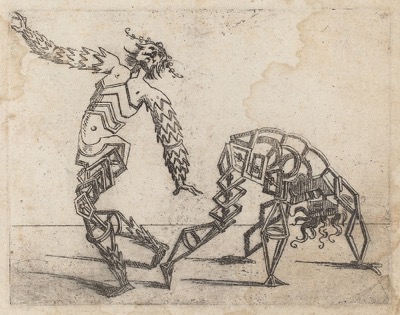
Giovanni Battista Bracelli: Bizzarie di Varie Figure (1624)
" … never more present than just after leaving."
We claim to move in, through, under, and on, but I suspect that we don't, not really, not nearly. Our apparent motion misleads both eye and understanding, for our momentum isn't as smooth and separate as it superficially seems, but sticky. We need nudges. We leave traces—of both our presences and our passings—much more permanent than contrails dissipating upon appearance. I think of myself as Mouving around with the sort of motion requiring a little shoving and a little mourning to get started, some elbowing to proceed, and considerable sloughing off along the way. I leave much behind me and unwittingly (inevitably?) carry much forward. I remain where I was, perhaps forever, and wherever I relocate holds traces from wherever I came. I seem to smear from there to here and onto my next appearance. I imagine myself moving through walls sometimes, and have even succeeded, but only when I accepted the irreparable damage my moving through them inflicted, to both the wall and myself. My lapels tended to be permanently dusted from those antics.
When The Muse and I were still consulting, we'd often encounter those we labeled The Complainants. Many of them had been sentenced by some superior—for "their own good"—to work with us, and most held at least a little grudge at the forced inconvenience.
SayingNothing

Emil Brack: The Picture Book (1900)
"We must have said everything worth saying … "
They say that there's no fixing stupid, but I believe that smart often proves even less fixable. There's never any real advantage for being the smartest person in the room, for instance, because everyone else will struggle to comprehend what the smarter one's getting on about. Out thinking others earns few appreciations, and that sort of reputation can leave one carrying disadvantaging expectations. Many will sit watchful, waiting for the so-called smart one to embarrass himself with seemingly irrelevant insights. Further, the really smart ones often find that their best contributions come from SayingNothing, from squelching their brilliance lest others find it off-putting. I confess that I don't know any of this from personal experience, since I'm rarely accused of personal brilliance, but I've noticed and I've known some smart people who didn't mind confessing their sins and shortcomings.
I once had a daughter whose story I might submit as prima facie evidence in my case. She died yesterday at the age of thirty eight, untimely, after a lifetime struggling to fit in.
TheSecondCar

Spanish cartoonist Pedro de Rojas: Don Quixote is driven to his village, from a series of chromolithograph postcards reimagining the adventures of Don Quixote and Sancho Panza for the twentieth century. (Circa 1905)
"That SecondCar might have represented a sort of vanity, standing squarely between here and a finer sort of sanity."
For most of our time together, The Muse and I have been a one car family. The first decade together, we owned two cars between us, a condition that both complicated parking and left one of the two cars idle while we used the other one together. We almost always headed out together. When we left the original Villa Vatta Schmaltz to move to DC, I sold my vehicle to my grand nephew for a quarter because we figured that it would make no sense to straddle ourselves with two cars in a big city. This move proved prescient, for in the six years we lived there, The Muse drove to work exactly twice. She much preferred to hop the much more convenient Metro down to The Mall where she worked. Even that one car mostly sat idle except for my foraging forays and the occasional toodle into surrounding countryside. Cities seem distinctly hostile to cars, which overwhelm them. For a while, we tried going carless, using busses and ZipCars when transportation seemed necessary, but this complicated beer runs—nobody needs anybody transporting half cases of beer on a public bus—so we after a month, bought a bit of a beater to better balance those scales.
Last year, visiting old friends in Tucson, we learned that they were retiring their old Lexus.
Bearding

Rembrandt: A Bust of an Old Man with Flowing Beard: the Head Inclined Three-Quarters Right (1630)
"I might even find deeper meaning in my life hiding behind a beard."
I think of myself as being in the meaning business. True, it doesn't pay much, but it's my manner of living. I can't accept face value. I believe that everything holds deeper meaning and that appearances prove misleadingly superficial. We can't tell books by their covers because book covers aren't books, but then neither are their contents. Books might be experiences never found very well represented within any of their components, of which personal reflection perhaps ranks highest. Books seem to be interactions, their meanings emergent, their significance widely varying between individual readers. A single book might hold as many meanings as readers, and perhaps many more than that, for deeper meanings exhibit great ambiguity, shifting as one plumbs deeper. As near as I can tell, meaning continues expanding as long as attention holds.
All of my adult life, I've maintained a cleanly-shaven face, with the exception of my once rebellious and since tamed mustache.
Drauma

A 1596 sketch of a rehearsal in progress on the thrust stage of The Swan, a typical circular Elizabethan open-roof playhouse
"We somehow seem to stumble into happy accidents, anyway."
Any change, even HeadingHomeward, will most likely introduce both some drama and at least a little trauma into a life: Drauma. My father forever wondered why people could not just leave well enough alone, for he'd come up through a Draumatic childhood. Then he married my mother who, though perhaps not at first a fully fledged drama queen, at the very least certainly qualified as a drama princess. Full queenship followed. He never escaped the sturm und drang, however much he might have preferred an alternate experience. There was always, always, always something threatening domestic tranquility, though, gratefully, usually little more than minor soap opera productions. He'd just be settling in for the evening, kids finally on the way to bed, when my mom's cousin would stop by to see his favorite cousin BonBon, upset the stabile force field, and maybe fall off the front porch in the process. My dad despised upsets though he never managed to shake their intrusion.
I'm little different. I much prefer the old status quo which, if only because of its aging status can never hold on for nearly long enough to fully satisfy me.
Carping

A Song dynasty painting attributed to Liu Cai: Fish Swimming Amid Falling Flowers (circa 1080–1120)
"No need to affect superior airs, for those suspend nothing really worth caring about."
Criticism seems to have overtaken plagiarism to become the latest sincerest form of flattery. In a world obsessed with attracting clicks, with drawing attention to itself for fun and profit, Carping has grown to become the primary export of each of this world's key economies. Once renowned for our wheat exports, The United States now primarily trades in agricultural-grade Tweets reeking of primitive fertilizer, each year producing formerly unthinkable volumes. Other than complaining while ignoring underlying difficulties, we've forfeited our farm economy to attend to the one activity certain to inflict the greatest harm on ourselves, we point out each others' shortcomings in lieu of tolerating or lending a hand. We deal exclusively in picking at low-hanging fruit, for why bother with hauling out ladders and stretching if we might might more conveniently savage whatever's already ready to hand? We discount each other better than even the biggest discount retailer slashes product prices. Once proud peoples have become simply whiny.
It's always, obviously, the wrong frickin' glass, whether half empty or half full.
GrowingInto
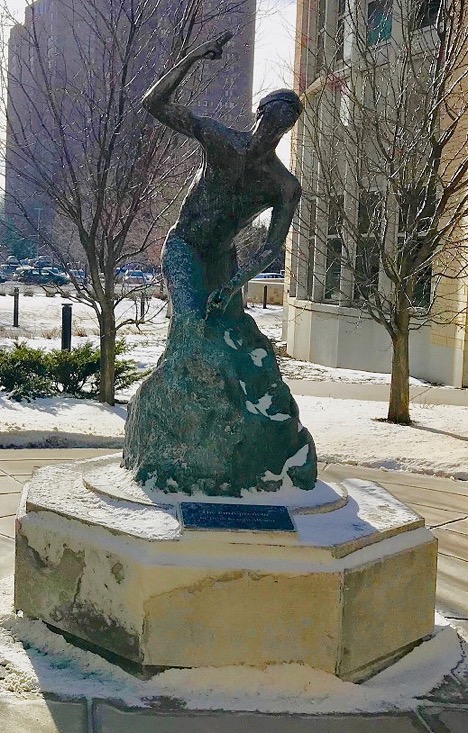
Kermit Allison: `The Entrepreneur’’
This sculpture depicts a blindfolded man chiseling himself out of a stone block. I wonder how he managed to chisel his hands into existence.
"It's exhausting, but it's a living."
Whatever else I might characterize myself as, unfinished properly summarizes my progress so far. I don't remember starting. I apparently awakened sometime later, my forward momentum already inexorable by then. I carried this marvelous property. I could sense space beyond me and propel myself toward it. This ability left me seemingly trailing a little behind myself, attempting to catch up. By the time I arrived there, though, another attraction had arisen in the distance and I would be heading off in that direction for a change, always changing. I grew to sense that I never quite arrived, with each arrival quickly becoming a fresh departure. I eventually abandoned any sense that I might eventually catch up to myself, accepting that I might well always find myself lagging a little behind. I can't quite capture the motion or the presence due to some delay in my capturing mechanism. I chronicle where I was, never where I am, because I'm never quite wherever I might be at any moment. I'm still GrowingInto.
Acknowledging this apparently essential disconnect seems fundamental to maintaining some semblance of sanity.
Changered

Marinus van Reymerswaele: The Moneychanger and His Wife (1539)
"Life might only make sense if it's surprising us."
Change arrives like a thief in the night. However well-planned anyone thought they'd "made" it, actual change always comes on its own terms. It will surprise regardless of anyone's beforehand anticipation. I think of this apparently inevitable effect as Changered, using the form it shares with conjured and snookered. It's always essentially a change-up following a carefully crafted series of ascending fastballs. It sets up the batter to fool himself, the wounded yelp following the umpire's call just further evidence, just as if we needed any, that difference respects nobody's patterns, nobody's model. We might eventually enjoy Changered's benefits, but initially it will seem to have taken mean advantage of us.
Remember when our recently formered President first took office? The shift jarred.
Won'ts
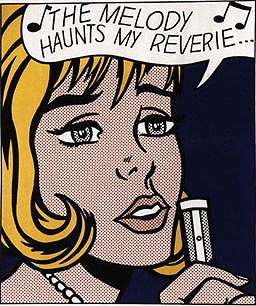
Roy Lichtenstein: Reverie (from the portfolio 'Eleven Pop Artists, vol. II') (1965)
" … nearer the center of MY universe where gravity just works right …"
I suspect that even a moderately skilled artist could create a near perfect portrait of me by merely portraying all I won't do, the image created out of essentially negative space. In my inhibited early youth, I maintained a long list of won'ts, and I didn't even consider myself to be that picky of an eater. Later, I set about relaxing my code and for a time became somewhat of a permissive libertine, agreeing to engage in some things apparently just to learn why I shouldn't. I learned better. Now, I've settled into what I consider to be a balanced existence, comfortable in my convictions buttressed behind strong defensive walls, My Won'ts serve as my castle, complete with parapets and banners. Mark Twain posited that the primary difference between a human and a jackass is that there are some things a jackass just won't do; they're stubborn. I think of myself as living toward the jackass end of the species spectrum, stubborn after a fashion, for I scrupulously maintain my Won'ts as both moral and ethical imperatives.
Moral imperatives include all those things others told me that I should not want.
Lightenings

Jules Tavernier: 'Sunrise Over Diamond Head' (1888)
"Life sure seems foggy this morning."
Some days I seem incapable of accomplishing anything. The following day, I might notice a definite Lightening as whatever weight encumbered me evaporates. I suppose that this most curious property isn't exclusive to me. Perhaps it's tied to some circadian emotional thing. Lincoln recalled that some days a black dog would visit him and lay him low, then a certain Lightening would overwhelm the gloom to reopen possibilities denied him just the day before. These visits remained unpredictable, never foreseen. On any given day he might be fully capable or essentially incapacitated, he never knew beforehand. Him being famous and all, I guess that his swings might carry more weight than mine, but I'm similarly unreliable. Back when I was charged with estimating project efforts, I wondered how I might account for this perhaps most human of qualities, for elements other than raw skill entered into accurately foretelling. The best contributor on a bad day couldn't quite compete with the worst on a good day, but I never found a way to pre-determine when any rhythm might overtake anyone. I stuck with an imaginary average instead, figuring everything would probably even out in the end, which it almost never did.
Yesterday, a Lightening visited.
BigBaby

Fernando Botero – Mona Lisa, Age Twelve (1959)
"Look, I tied my own shoes this morning!"
Adulthood brings more opportunities for me to behave like a BigBaby than I ever enjoyed as an actual infant. Strict parents continually encouraged me to act more maturely than my age, so I figure that I used up some of my grown up behavior well before I reached puberty, which left adequate untapped reserve to keep me in decent stead through to the very edge of my dotage. Unfettered by hovering parents, my inner BigBaby has increasingly flourished, gaining what I consider to be near master status in my sixties. Never much of a fit pitcher, I rarely rage, but I excel in the slow walk procrastination competition and my petulance has never been better formed. With all humility, I sense real mastery in my performance of the always irksome disappearance routine. With my well-developed adult intuition, I can almost always sense when a quest for assistance begins and I cleverly seem to disappear just before it finds me. I've also worked on my sorry face for later, when I learn that if only I had been available, I could have proved useful. Cruel fate, huh?
I might shine most brightly when undermining myself.
AlienatingAffections
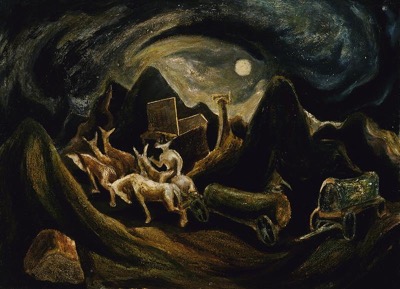
Jackson Pollock: Going West (1934-35)
"Let the record show that I came to genuinely love this place …"
HeadingHomeward induces a perhaps necessary hardening of the heart toward this place I'm leaving, even though my relationship with this place has always been a forced marriage. It was not anything like the sort of place in which I'd ever imagined living. My first impression caught me wondering if I'd actually been reduced to living in something like this. It was way too new for me, stylistically strange and curiously laid out; ceilings too high and yard too narrow. The views seemed fine, even extravagant, though one does not inhabit views, or so I told myself. I told The Muse that I could see myself living here, though I really couldn't. Not then, but we'd been searching for someplace to live for six discouraging weeks, we'd only seen variations on worse, mostly much, much worse. I was ready to be finished searching and in light of then present conditions, this place seemed good enough. I told myself that our commitment wouldn't be forever. We both knew we'd be moving on in five years or so, so we settled. Forever.
Settling involves accumulating small affections.
Asymptoting
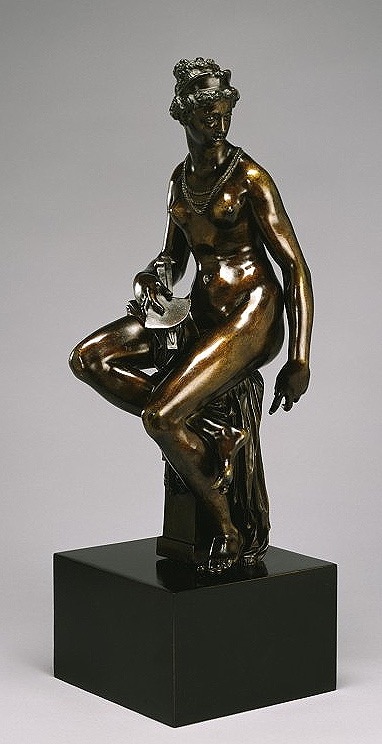
Jean Boulogne [Giambologna]: Allegory of Architecture (ca. 1580; Cast: 18th century)
"Our future must remain in the future tense to make any sense at all."
I claim to be HeadingHomeward while I might more descriptively insist that I'm Asymptoting there, but Asymptoting sounds like another one of my made up words, one of those requiring further explanation. I won't mind explaining if you can bear to listen to my blathering. You see, Heading connotes a more definite direction and a more certain destination than my present adventure wants. I hold a general direction in my head, but it's really little more than an intention yet. Likewise, my destination seems tenaciously uncertain. Oh, I have a specific address in mind, but mere location hardly a destination makes. Aspiration might better describe the direction I'm heading, more feeling than anything, so I consider myself Asymptoting, after that geometric concept of a trajectory unlikely to ever find its target. An asymptote, as you doubtless already know and which I'll explain just to remind myself, is a not necessarily straight line destined to move ever closer to its destination as it lengthens, but often an arc or curve certain to never actually arrive there. Over time, it might well manage to move close enough for most intents and purposes, but it will most certainly never actually arrive.
Why be so picky about making this distinction? I'll explain by referencing Eric Hoffer, the longshoreman philosopher, who insisted that only fundamentally unachievable objectives ever manage to become transformational.
Betterings

JR, the Parisian artist, made the iconic Louvre pyramid disappear 2016, but only for a weekend installation.
"I learned again, but I doubt that I'll remember."
I'm not tumbling into cynicism when I suggest that every attempted step forward tends to first feel like a step backward. Improvements, however aggressively pursued, seem to require some time to manifest, however urgently desired. It might even be true that greater urgency tends to slow down a desired manifestation, often first producing frustration instead. Once envisioned, a novel objective appears much closer than it ever turns out to be. Foresight transports the mind but not the body, unfortunately. I too easily over-inflate my expectations. I reach for some alluring star before gravity steps right up to remind me who and where I are. Dammit!
I might imagine that I would eventually outgrow these childish expectations about Betterings, but this old dog continues to tumble into his oldest trick, which suggests I will probably not be maturing very much beyond where I started on this issue.
Lielessness

Jean-Baptiste Oudry: Ragotin lie par les parents du fou (1727)
"I feel as though I’ve just come home after an overly-extended absence."
I suspect that everyone knows the experience of living a lie. For me, a deep longing accompanies these times as I watch others apparently living their truths seem so damned free. Unencumbered by any haunting sense that someone's going to catch on to them, they seem untroubled even when engaging with difficulties, while I carry considerably more overhead. The lie's like a colicky baby, always fussy and rarely at rest, demanding that I attend to it. I nurture it because I simply must. It eats half my lunch and the world seems cruel and unjust. I render myself a second- or third-class citizen, relegated to entering and exiting like a sneak thief always attempting to get away with something that rightfully belongs to someone else. I, myself, feel like I'm someone else beside myself.
Liberation might come but only ever at the price of doing an utterly unthinkable, something more likely, it seems, to do me in rather than resolve anything.
LooseTalk

Allart van Everdingen: The Bear Distracted with Talk of Honey, (c. 1645-1656)
"Some adults never grow up."
In my youth, I was prone to embellish my stories. I won't deny that vestiges of this tendency remain, but I prefer to think that I've learned something in the interim. I monitor my talk more closely now, and though The Muse will certainly attest to the fact that I'm not above the occasional whopper, I tend to launch them in jest rather than in pre-emptive self-defense. My experiences, I'm slowly becoming convinced, might just be good enough as they sit. I'm more apt these days to play down my role than headline it.
As a direct consequence of my earlier embellishments, I've suffered considerable embarrassment, which I prefer to believe has justifiably humbled me a bit.
Migration
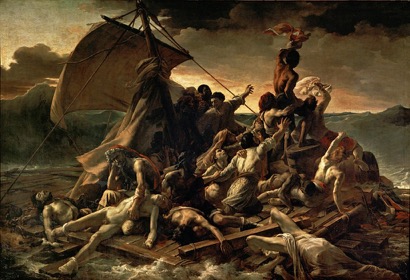
JEAN LOUIS THÉODORE GÉRICAULT - La Balsa de la Medusa (1818-19)
"Migrations seem mostly uphill …"
I expected to post no new HeadingHomeward Story today because I'm migrating between machines. After 15 hours in migration so far, I finally received feedback about expected remaining duration: 3.5 more hours. I cannot predict how or whether this attempt (4 or 5, I've lost count) will work. I'm assuming that it will stall like the prior attempts have stalled without providing any information about progress achieved. Based upon experience so far with Apple's automated Migration Assistant and a painful perusal of the destructions for affecting a "clean install", I'm not hopeful about ever successfully completing this migration. (The "clean install" instructions are incoherent and uninterpretable.) I dare not update my blog before completing the full migration, since that would put myself out of synch with one of my alternate selves, which would produce further complications including another identity crisis. Further complications or identity crises I do not need.
Rest assured that Apple continues to live in blissful ignorance of how their computers are actually used while continuing to make them ever more similar to their dreaded old adversary the meager PC.
Cornspiracy
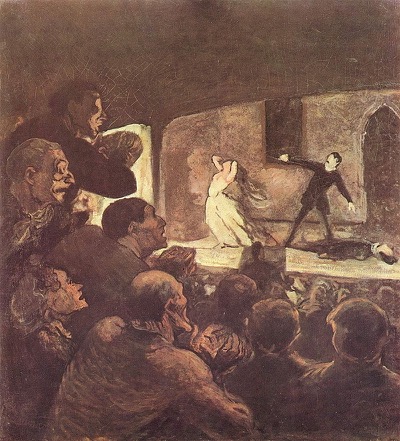
Honoré Daumier: Mélodrame (circa 1856-1860)
"We reap whatever we plant."
The media almost exclusively refers to them as theories, though there's almost nothing theoretical about most of them. Few seem structured following any framework even distantly borrowed from proper theory form, which, I guess suggests that whomever came up with them was not studied in the sciences or liberal arts, probably not very studied at all other than, perhaps, in persuasive rhetoric. No harm or foul for that infraction, though they tend as a result to make little sense, except to those for whom they apparently don't need to make sense to gain their acceptance, those who parse for attraction rather than cogency. These—I'll call them Cornspiracies—might be only what their followers want to believe, their crafters caring little about any underlying coherence or factual basis. Millions have apparently scrambled in line behind them, armies of True Believers following fallacious facts, utterly convinced of their righteousness. Many seem to have taken up arms to overthrow oppressors who never were and never could have been. What do we do with them?
They say that they find it particularly annoying when non-believers talk down to them as if they were stupid.
Walled

Jean Fouquet: The Conquest of Jericho. Illumination, dated c. 1470-1475
"Until there's juice, it's just no use. One good excuse's enough."
I titled the third chapter of my best-selling The Blind Men and the Elephant (Berrett-Koehler 2003) The Wall, but apparently half a lifetime studying and teaching about The Wall didn't predispose me to recognize its presence when I encountered it again. In my book, I explained that every undertaking encounters The Wall at some point, and The Wall seems to swipe motivation for engaging. A physical barrier isn't usually the source of this difficulty, so it can prove tricky to diagnose and resolve the blockage. I suggested in the text that purpose might be flagging and in need of some renewal to produce a juicier sense of anticipation. For me, a new opportunity most often manifests as an almost (or even actually) overwhelming string of impending obligations, and that, if I chase after the result, I'm suddenly conscripted to fulfill every damned one of them. I see a stream of exhausting efforts rather than my heart's desire manifesting before me. Most adventures look more like chores than opportunities once the initial Utopian conceiving's dissipated, and sometimes, reimagining purpose can cause that emotional barrier to crumble.
As with most information, knowing about The Wall doesn't inoculate anyone against encountering it and also contributes little to helping anyone recognize when they're in the presence of it.
Cynic-ism

Salvator Rosa: Diogenes searching for an honest man (mid-17th century)
"The cynic unerringly sees what's missing and misses what's right there awaiting recognition."
I have long held as a personal ethical responsibility the obligation to know enough to justify cynicism while steadfastly choosing not to become cynical. Maintaining this balance seems increasingly difficult, as the older I become, the more familiar I've become with entropy in action. In my relative youth, entropy seemed more theoretical than practical. The 1950s seemed far more futuristic and fresh than its shopworn post-millennium counterpart seems today. Twenty years into this once new century, the future seems considerably less promising and our mistakes much more encumbering. I suppose innocence started abandoning me in earnest after I crossed fifty. The experience haphazardly replacing innocence seems less sturdy and hopeful. I admit to knowing ever more of what might reasonably render me cynical, yet I persist in my insistence that I avoid becoming a cynic. I'm no cynic yet.
Yet I admit to peering out into this world with an increasingly skeptical eye.
BetterAngels

Ignacio de Ries: Saint Michael the Archangel (1640s)
"I intended better than I will likely receive."
Everyone carries one act on their shoulders forever, one irrevocable fart they innocently let which pretty much misdefines their legacy forever. For our widely-esteemed sixteenth President Abraham Lincoln, I suspect that his act invoking "better angels" into his first inaugural speech might justifiably forever generate his remorse for having brought that phrase prominence, though he apparently swiped it from Shakespeare's Othello. I imagine him blushing whenever it's invoked, wherever he is. Note that he made this comment innocently. He could not have been aware in that moment that he'd just birthed his legacy, forever after remembered. He'd, you'll no doubt recall, surreptitiously sneaked into Washington to deliver that speech, dogged by threats of assassination from angry southern white supremacists, the Proud Boys of his time. His losing opponent was one of those self-promotive personalities prone to do little in office who had aligned himself with a party too distracted by self destruction to garner a majority in the election. Since, venomous politicians have invoked Lincoln to encourage their political foes to find reason and come over to their dark side, often appending mumbles referencing "malice toward none" and likewise. The phrase "better angels" has become a not very subtle tell of some worser angels working overtime behind the scene, an invocation meaning pretty much the opposite of what it seems, more taunt than invitation.
I'm uncertain if I subscribe to the whole medieval notion of better and worser angels.
Wending

Ercole de’ Roberti: The Miracles of St Vincent Ferrer (1473)
"… We might just be setting ourselves up …"
The pathway between any two places never runs in anything even vaguely resembling a straight line, yet in my mind, when I envision a journey, I seem only capable of imagining straight-ish lines. My experiences, then, diverge from my plans, continually surprising me. This result probably has most to do with a personal limitation, not precisely a lack of imagination, but a limited one, and the inherent difficulty of plotting curves using only straightedges. I thought I'd long ago immunized myself against shock or surprise when encountering these divergences, but I apparently had not. They get me pretty much every time.
My "discovery" that nobody ever appreciates an accurate plan marked a huge leap in my maturing as a project manager.
LongDivision

Raphael: The School of Athens fresco, Cropped Image of Pythagoras (1509)
"… our well-being might more depend upon how well we divide."
The Muse and I tried listening to the radio as we drove back home following the 9/11 attacks. We'd been setting up for another workshop at The Los Alamos National Laboratory when the news started filtering in. The participants at first opted to continue with the session, since we could do nothing about those distant events, but shortly thereafter, armored Humvees with mounted fifty caliber machine guns began circulating through the streets and orders came down for everyone to evacuate the mesa. We cowered overnight with friends before the rental car agency extended an offer for us to just drop off the car at the airport we'd flown out from a few days previous, waving the usual drop charges. The radio, sometimes a useful distraction on long drives, proved discouraging then. In lieu of the news we'd hoped to receive, only propaganda spewed, the most vile and vindictive speech, saber-rattling on steroids. We quite understandably wondered what country we were passing through.
That evening, we overnighted in Mt. Crested Butte, Colorado, the town where The Muse and I first met.
TrueBeliefers

Michelangelo: Libyan Sibyl (circa 1511)-from the Sistine Chapel ceiling
"I know almost for certain that greater belief won't resolve this one."
I've been reading (finally) Eric Hoffer's The True Believers, a remarkable read that has sat on my dustier library shelf for thirty or more years. I'd occasionally take it down to search for some quip which I intended to use to bolster some argument, but had never sat myself down to plow through the actual content from cover to age-stiffened cover. The front cover detached itself when I opened it, so I've been using it as my bookmark, for I've been pausing frequently, since the prose seems the rough equivalent of heavy cream. One might be well-advised not to chug anything with the consistency of heavy cream, but to swallow it following demure sips, savoring it, and letting it slowly sink in. The author was a San Francisco longshoreman and was in his time a much-revered everyman philosopher, though he hardly qualified as an everyman. Between age five and fifteen, he was blind, an affliction that came and eventually went without explanation or diagnosed cause. He therefore missed his primary education. Shortly after regaining his sight, he lost both parents and set out on his own, wisely choosing to leave New York for California, where he figured at least the weather might suit him. He worked as a migrant farm laborer, being uneducated and all, though he carried a pocketful of library cards he'd collected as he moved between crops. Longshoring amounted to upward mobility, for he could settle down and engage in his heart's passions, studying and writing, when he wasn't laboring.
The True Believer reads as if it was penned by a self-educated man, with wide references to ancient texts few colleges delved into even then.
Rumurmuring

Artemisia Gentileschi: Susanna and the Elders (1622)
"It's eye for an eye and spy vs spy …"
Rumors constitute the primary product of every home town. Whatever it might have grown famous for producing—onions in the case of my hometown—the principal occupation of every living soul seems to be the production and distribution of unsubstantiated murmurings, RuMurmurings. So-and-so always seems to be up to her old shenanigans. You-know-who just did it again, twice! The "real" story, preserved for the select few, always seethes just beneath whatever formal business might be conducted. Everyone carries a reputation and a well-acknowledged-but-never-mentioned-in-public label, be it 'slut', 'drunk', 'bastard', or 'saint.' Nobody long escapes somebody's sharp-tongued critique, and little of the Rumurmuring seems generous at heart. It sometimes seems as if everyone's actively working to bring everyone else down a peg, to set straight some crooked story, to highlight everyone else's clay feet. There are no secrets, many, almost factual..
I sometimes think we must be crazy to aspire to move back there where everyone lives in wavy glass houses whose windows feature bubbles, waves, inclusions, and varying thicknesses, producing a funhouse transparency.
SmallTalk

Johannes Vermeer: Christ in the House of Martha and Mary (About 1654 - 1656)
"Hey! Nice shoes! Howya doin?" …"
I'd visited the discount pet supply store because I'd failed in an earlier attempt at the anonymous Kroger's to buy the only kind of cat food Max and Molly agree to eat. I'd learned in a SmallTalk exchange a few weeks before that this particular brand had been suffering distribution issues, with my favored jumbo family-sized packages no more than sporadically available. I'd picked up the wrong kind a couple of times only to find that they'd try to bury it before they consent to swallow it, those batches donated to the magpies or the cat shelter. They're picky eaters. As I was checking out, separated from the checker by a plexiglas partition and our masks, the checker attempted to maintain some semblance of normality by initiating a little SmallTalk, the very foundation of every commercial interaction. I honestly thought that she'd, for some reason, asked to see some picture ID. I figured there was a new directive from Homeland Security, so I struggled to remove my driver's license from my wallet, "No," she said, "I asked if you had anything exciting planned for the rest of the day." Embarrassed, I replied with a curt, "Probably not," collected my cat food, and left thinking that This Damned Pandemic might have killed SmallTalk.
SmallTalk has always been the glue of human interaction.
TheSoaps
"As long as self-worth is tied up in someone else or something else, the stage is set for rage." Virginia Satir
" … sanity might only exist in strict isolation."
My paternal grandmother was addicted to TheSoaps. Whatever else she might have been engaged in, when the time came for 'her shows,' us kids would get kicked outside for the duration. I'm certain that she loved us, in her fashion, but I'm even more certain that she loved 'her shows' much, much more. How could she not? 'Her shows' offered access to the glamour and sleaze her actual life sorely lacked. She'd already out-lived three husbands and had neither aspirations nor prospects, so she apparently opted to live vicariously. Who could blame her? She'd sit rapt and speak to the TV set, offering sage advice to the racy divorcee on the screen, probably from her own vast experience entangled within various love triangles. I only ever saw her exhibit fits of genuine rage when Lance or whatever his name was stepped out on his wife again. In those days, three or four full middle-of-each-weekday hours were reserved for goings on along The Edge Of Night, and she'd never miss an episode. She even subscribed to Soap Opera Digest so she could pour over prior plots and engage in speculations over where those stories—her extended family, really—might next turn. Even then, I thought TheSoaps a sad surrogate for what we'd later label A Life.
I, too, spend many hours each day with headset in place, tuned into some more pleasingly distracting alternate universe.
patRIOT

John Singleton Copley: Paul Revere (1768)
"One can inevitably only ever pretend to be an actual patriot."
I do not consider myself a patriot, so I might have no standing to suggest that something seems incongruous about anyone declaring him or her self a patriot. Patriot seems like one of those designations properly bestowed posthumously upon a humble contributor by a grateful community, not something anyone might print on their own business card. That seems a presumptive designation. I also struggle to understand the -RIOT segment of the modern usage of the term, which was not previously rendered in CAPS, but in more demure equality with the first syllable in lowercase type. We witnessed this week, though, both great presumption and a resulting RIOT, which might have permanently perverted the once honorable designation. We see patRIOTs now, citizens not taking up arms against some degrading foreign power but, as near as I can tell, against themselves and nobody else. They've themed themselves to become their own nightmarish worst enemies. Other than my stiff opposition to wearing ridiculous slogans on my clothing, I see little physical distinction between the typical patRIOT and myself. Their actions, though, seem to set the patRIOTs apart. They wear their grievances proudly, a fashion faux pas bordering on humiliating. Humiliating one's self serves as no adequate surrogate for genuine humility. One's patriotism seems properly rendered only in the eye of a beholder, never in the mind of any pretender. One can inevitably only ever pretend to be an actual patriot.
We increasingly engage in political cosplay.
WakeUps

Jan Matejko: Stańczyk during a ball at the court of Queen Bona in the face of the loss of Smolensk (1862)
"The Amish were right, we're too late Schmart."
The morning headlines label it an unprecedented coup-attempt, an insurrection, sedition, and it might well qualify for all three of these labels. It also represented the most common of human outcomes. Oh, I understand that thwarted self-proclaimed patriots vowed to return in the morning with muskets, but that threat hardly matters and can't quite qualify as a concern. I thought the Capitol Police brilliant in their defense of the institution, though it might have appeared to more naive observers that they'd been too easily out-flanked by the mob. They denied that mob the martyrs they might have aspired to produce, instead, ceding that long-offensive car to the yapping dog's jaws. We watched as the pride seemed to drain right out of those boys once they'd achieved their long aspired-for goal. What did they do with their freshly-gained authority? Well, I guess they planted a couple of amateurish pipe bombs. Other than that, they seemed quickly bored with their achievement, posting a little graffiti and lounging in chairs of the long-reviled powerful, looking a little surprised that those seats transferred no enlivening power into them. They dispersed with nothing gained, their purpose drained as a direct result of having achieved it, an overall disappointingly amateurish theater production. Utterly ordinary.
Revolutions usually work this way because their leaders tend to be tenaciously short-sighted, largely because their loyal followers insist upon short-sightedness as a condition of their fealty.
Natterer
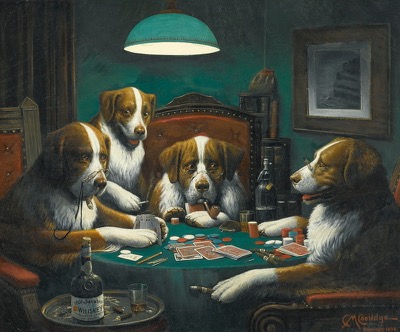
Cassius Marcellus Coolidge: Dogs Playing Poker (1894)
"Action's highly over-rated."
I acknowledge myself to be a dedicated Natterer. I consider most interventions worth deep consideration before engaging in. I'm that old dog that just seems to have to circle the spot where he always lays down before actually plopping down there. I look around before leaping, and might choose not to leap at all after considering. I seem to need to construct a mental model before I begin. I construct a mental model TO begin, for I almost always start my actions that way. Yes, these things take time. Everything seems to take time, so more time doesn't seem to matter to me just as long as I'm productively engaged in some nattering. A small chore, fully considered, might take me until the middle of next week to appear to even start, though I've very likely started nattering about it long before anyone notices any actual action out of me. I might explain that I'm thinking, though I know deep inside me that I'm actually actively nattering instead.
Once I became a world-class Natterer, I found that I'd developed an entire vocabulary to explain myself to any witness to my proceedings, or, more usually, my lack of proceeding.
Smarter

Chen Hongshou: painting of Tao_Yuanming (Ming Dynasty)
"Everyone's Smarter than everyone else."
I used to help facilitate experiential leadership workshops where I'd invite participants to engage in a variety of what I referred to as Silly Little Games. Those games were anything but silly, though they certainly often appeared absurd, at least at first. I'd often ask after an exercise ended, when reflecting upon what had just happened, "How did you exhibit leadership during that exercise?" It became quickly apparent to me by the shocked looks on people's faces when I asked that question that many had not thought they'd exhibited much in the way of leadership during the exercise, and some would readily admit that they'd missed an opportunity to exhibit it, since I had not declared that the purpose of it was to provide a medium for each person to demonstrate leadership. Though we were in the middle of what had been advertised as a leadership workshop, I'd felt no pressing need to re-remind every participant of the workshop's advertised purpose. Besides, I figured individuals could use the experiences for whatever purpose they wanted and I didn't want to hold them hostage to satisfying my needs for them. With a little subsequent prodding, though, almost everyone came to recognize that they'd somehow exhibited leadership however they'd engaged, even the wallflowers, even those who'd taken a bio-break rather than actually engage. We came to rediscover that leadership, whatever that might entail, comes in at least ten thousand different guises and can often only be recognized by the one engaging in it, and then, only if that one's rather generously observing themselves. Influence extends far beyond anyone's senses.
I was thinking about that exercise as I entered a BIG box hardware store yesterday, on a mission to find a tool which I could not describe to myself, much less to any clerk, in the unlikely event that I might encounter a clerk there.
Worser

Edvard Munch: Ashes (1895)
"Our fundamental decency some days seems wasted on the wrong people."
The December 28, 2020 issue of The New Yorker features a thirty-five page essay by Lawrence Wright titled The Plague Year. This reporting should be required reading, for it represents a first draft of a history that seems destined to define our times, like John Hersey's 1946 New Yorker piece, which took up the whole issue, exploring how six survivors experienced the atomic bombing of Hiroshima. Hersey co-opted then current reporting norms by focusing not upon the usual abstractions, but upon the human experiences of six so-called survivors who would never recover. Wright takes a similar tack with Our Damned Pandemic, focusing upon the experiences of a few within the dizzying swirl of unfolding current events. A general sense of impotence emerges as actual experts find their perspectives discounted and discarded in favor of fairy tale public pronouncements and innocents falling prey. Following the nuclear bombing of Japan, a whitewashing occurred, largely by tacit agreement. Correspondents long accustomed to minimizing the horrors they'd witnessed under the firm belief that their readers would not appreciate absolute authenticity, easily accepted often unspoken sanctions against submitting genuinely ugly stories describing truly awful events. Those responsible for informing those not witnessing wore rose-colored glasses when reporting. They'd get the numbers right, more or less, but they figured, I suspect, that depicting the depths of the actual depravity involved wouldn't win them many appreciations. In any society, one at least attempts to uphold a baseline of civility, even when—and probably especially when—unthinkable degradation occurs. Wright avoids this convention.
The Muse's sister, an emeritus professor who taught biology and statistics, has been posting daily updates on This Damned Pandemic since last March, today's update number 315 in an uninterrupted stream attempting to explain whatever was happening and extract meaning from those events.
Coruge

Pieter Lastman: Odysseus and Nausicaa (1619)
"A country that cannot distinguish between Courage and Coruge can only corrupt its purpose."
The Plague Year now passed if not nearly over provided many opportunities for mere mortals to demonstrate extraordinary courage, by which I mean, of course, the perfectly ordinary kind. One doctor, when recounting her first encounters with the COVID-19 virus, explained the dilemma she faced. If she didn't touch the suffocating patient, he would surely die, and he might die anyway. If she did touch him, she might die. She touched him. She and her staff completed their wills and set to work. That's courage. I describe her act so that I might clearly distinguish it from another side-effect of this plague still ravaging us: Coruge. While courage seems fundamentally generous, Coruge seems merely self-important. It takes no courage to refuse to wear the most effective defense against this plague, a mask, it only requires a stubborn self-importance, as if that, in any larger scheme of anything, qualified as in any way important at all. I would call Coruge foolhardiness, but it hardly seems quite hardy enough to qualify. It's merely foolish, a form of arrogance acting out, the insistence of exception to a well-established rule. It's an extension of the more primitive notions of freedom running around these days, the ones that its adherents insist amount to God-given rights to assert whatever they believe to be a right as received wisdom, superior to every other.
I hold no great insight into the nature of Coruge, other than to say that from the distance I maintain, it seems rather pointless and stupid.
Distributing

Albert Bierstadt: The Oregon Trail (1869)
"Whatever else we're intending when Distributing anything, we're Distributing our own naive experience first."
My forebears crossed the much-vaunted Oregon Trail, and try as I might, I cannot quite imagine it as being anything other than a primitive sort of Interstate Freeway. Eye-witness accounts reported a ragged line of discarded furniture, broken wagons, and garbage, alongside an open sewer ditch, with grave markers a frequent sight. Nothing about the trip proved to be nearly as romantic as the paintings of it suggested. Migrants were said to have felt deep disappointment when they saw that their trail would not route them through the Eden the brochures had promised. Even today, we tend to glaze over logistical complications. That pre-pandemic trip to France included an ordeal of airplane connections and discomfiting boredom no entertainment system built into the seat back in front of you could possibly blunt. One arrives half dead in Paris, and spends the first day or two recovering. It's no different for anything we blithely ship. The couple of dozen Christmas packages we mailed took surprising trips, with one pair, addressed to locations less that two miles from each other, arriving four days different. I've had, like you've had, packages routed across the country multiple times and take two weeks to accomplish a standard two-day delivery, with me amusedly tracking 'progress' all the way. Them's the breaks, even with a mature, well-broken-in distribution system. Inefficiency's built right into every one of them.
Wartime's much worse.
Losting

Titian: Diana and Actaeon (1556–1559)
"I'm coming to understand that the purpose of Losting, of learning, is not to get found but to get better at coping with feeling lost."
Feeling lost seems the most reliable indicator that I'm learning. I learned or presumed early that I should avoid feeling lost. I felt embarrassed when introduced to some new concept in school, and attempted, often unsuccessfully, to appear that I immediately understood it. Then, I'd feel ashamed as well as lost. Much later, I came to understand that I'd utterly misunderstood the purpose of school. I'd naively believed that it was about knowing, about demonstrating knowledge, when it was properly understood as being about learning, which might often induce deep feelings of being lost, Losting. Up until about the seventh grade, learning only occasionally induced a sense of Losting in me, for I was a bright lad with strong intuition. Beyond elementary education, though, intuition fails to anticipate much of what's presented, as increasingly complex concepts insist upon deriving answers by employing specific processes. Few intuit algebra. Even fewer accurately anticipate history. These require rather more memory than instinct, and forms of discipline demanding considerable Losting before assimilation occurs. If one favors avoiding experiencing Losting, one loses opportunities for learning many things. Once learned, the Losting diminishes, and I suppose that folks can just lean back on their laurels and cruise. Repeatedly avoid Losting leaves one in a nasty lurch.
A New Year appears and I suspect that I really should be making resolutions as if I was not Losting into it.
Appreciatings

Charles Deas: Long Jakes, "The Rocky Mountain Man" (1844)
"Thank you for helping to make my old year happier!"
I had to be taught to appreciate. I was not born with the skill. It wasn't until I was in my thirties that I learned the first thing about how to congruently accomplish appreciating, and I still feel at a disadvantage when challenged, as I am this morning, to extend some genuine Appreciatings. This being the last day of this year, I've decided to attempt the opposite of what Auld Lang Sine asks. Should old acquaintance be forgot? I suggest that old acquaintances should properly be warmly recognized with Appreciations on the last day of the year. Every pundit known to man and beast has already submitted their regrets for the year now passing, for it was a remarkably disappointing year in many respects—most, maybe, but hardly entirely. For me it was a year of tremendous personal growth influenced by my encouraging audience, the majority of whom distinguished themselves as repeat offenders, showing up and even coming back again and again and again. What gives?
I started PureSchmaltz as a form of giving.
HealthScare

Ernest Board: Albucasis blistering a patient in the hospital at Cordova. (Circa 1900).
"It's just there, best avoided, forever poised ready to serve somebody else."
I called in sick yesterday, a rare occurrence. Like anyone, I tend to work right through sensations of illness, never knowing if I'm sick or just tired, or both. My basic strategy for treating any apparent anomaly amounts to giving it a day or two to see if it gets any worse and if it gets any worse, to give it another day or two to see if my condition further degrades, the upshot being that I almost never reach a point where I seriously consider consulting with anyone other than The Muse, who maintains her own superstitions and folk remedies. A doctor's visit requires the rough equivalent of an act of a divided Congress to schedule and these generally amount to me failing to describe and the doctor blindly prescribing, with me reporting side effects resulting from the last round of prescriptions. I tend to spend much of my doctor face time trying to convince the nurse practitioner why I'm not a good candidate for her current pet treatment. Even if I have sleep apnea, a condition I've yet to muster a belief in, I would never consent to wearing an electric muzzle to bed. A man must somehow maintain his dignity. I contend that I'm not sick, a condition modern medicine struggles to cope with.
Still, I do have my days when whatever ails me actually ails me.
ThePetulances
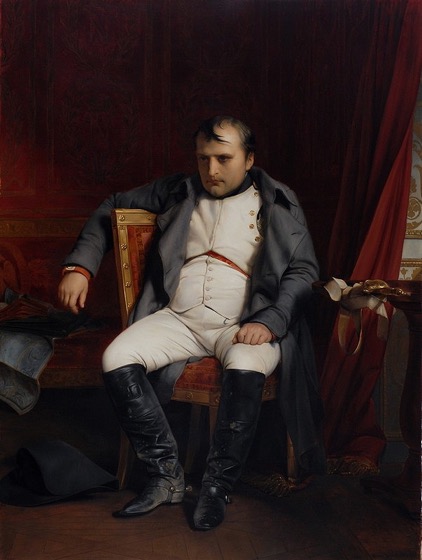
Paul Delaroche: Napoléon abdicating in Fontainebleau, 1845
"Nobody ever rides anywhere worth going to on the back of grudges fueled by ThePetulences."
We're each and all heading in the same direction. Lowly and highborn, professional and gig, smart and stupid, born equal and perhaps steadily heading downhill thereafter. If circumstances don't get us, time certainly will. The devout contend that we're heading for a better life following this one, sure and certain of ample reward for whatever humiliation life heaps upon them. All will be humbled, though the humiliation part seems entirely optional. Some become powerful, after a fashion, though none ever powerful enough to make good on any delusion about what that power might purchase. Most learn that power carries a counterbalancing powerlessness, with only ThePetulences ever bringing the two into balance. One might pretend so convincingly as to convince them self, less frequently someone else, rarely a majority. The positioning matters, since the nonbelievers can natter even noble intentions to shreds. It generally behooves anyone wielding power to handle it with greater care than their charter implies they might, for asserted might naturally translates into neither right nor acceptable. Power either humbles or humiliates. An absent humility guarantees eventual humiliation.
Not everyone gifted with authority seems to understand the humility it demands of them, or prove capable of providing it.
Disposaling

Eugene Berman, Italienne Symphony II (1940)
"The cats receive an hour's free entertainment …"
I received perhaps the greatest gift ever when my email inboxes disappeared from my iPhone on Christmas Eve. Long a point of continuing frustration, their sudden absence felt freeing. I know, I'm supposed to grieve the loss of 3500 messages I had never been able to keep up with, but I could never keep up with them, and though I retain a sense that something important must have been hidden in there somewhere, besides an irregular seli-annual purge of the contents, I never found in there anything like A Publisher's Clearinghouse announcement that I'd become an instant millionaire. Mostly, detritus resulting from some fleeting past association that had produced sometimes daily updates from which I'd never figured out how to unsubscribe and trivial updates from the homeowner's association announcing that some member or another had received approval to install new windows, I only felt oppressed by their presence. My occasional review of the inboxes, never a regular part of my regimen, left me more skilled at deleting without reading them, hundreds each day, it seemed, hardly a skill much prized in anyone's marketplace. I found some retained on my laptop, but felt free that my iPhone would no longer present this overwhelming doodlebug hole of a challenge. Praise be, indeed!
Little of the garbage I generate so easily and permanently disappears.
AlternateUniverses

Elihu Vedder: Mural, Lobby to Main Reading Room, Library of Congress Thomas Jefferson Building, Washington, D.C.
Main figure is seated atop a pedestal saying "CORRUPT LEGISLATION".
"I might have always been more potential than being."
None of my life makes any sense without accepting the likelihood that AlternateUniverses exist. I might instead attempt to follow a thread I presume to connect the disparate portions of my existence so far, but that story, one attempting to relate each piece to every other, strains credulity more than the AlternateUniverses alternative; it would not make believable fiction. I'm not arguing in favor of wildly divergent spaces, but subtly different ones, at least for the most part. I've thrived in places I formerly considered uninhabitable and found almost uninhabitable places touted as the best Earth has to offer. I feel fortunate to have experienced such tremendous difference. I've struggled with pretty much every transition, for within each I first searched for stuff that could not be found there because it didn't exist there, but I eventually adapted after some fashion and found myself settling in, usually in spite of initial instinctively unhelpful adaptation attempts. I found that I had to let go of some expectations to appreciate each place. What appeared, for instance, on my first visit to New Mexico, as a culture full of crappy gardeners later came to seem one which had adapted well to the local terrain. There are no English Country Gardens thriving in parched high desert country.
I feel proud to report that I spent considerable time over several years writing and reading in the Main Reading Room of The Jefferson Building of DC's Library of Congress, by far the most complete library ever assembled.
Done-d

Caravaggio: Saint Jerome in Meditation (1606)
"Doneness, a negotiated settlement."
Back when I consulted with projects, I noticed the curious relationship every project seemed to have with doneness. Similar to each project's initial charter, none managed to muster a very complete description of their destination. "What will 'done' look like," I'd ask, as if that constituted a reasonable question. And most accepted the question with a tinge of guilt, just as if they'd known that they really should have answered that question as a precedent before beginning. None had very clearly described their requisite initial conditions, either, which might just be a polite way to say that their project had gone off half-cocked. They'd garnered permission to start, even received funding, with hardly a half-assed notion of what they would be doing. I came to understand this state as a necessary one, and in no way evidence of the least bit of aberrance. Everyone did it this way for the simple reason that no alternative existed or could be accessed in real or any other time. Sure, each effort could improve by better defining its identity and its objective, but no project ever successfully satisfied their aspiration to have actually done either. Done, I came to understand, was not a state, though one might negotiate into an acceptance that they had achieved some good-enough state of description, but only after having achieved that state, never in anticipation or at the moment of arrival. Done is a reflection, a tardy recognition, not a discernible or definable place. Stuff gets Done-d, never done.
Done-d usually feels like an abandonment to me.
GraveMisgivings

Daniel Maclise: Othello, Desdemona and Emilia (1867)
" I will continually eliminate intrusions and remulch familiar dirt …"
As near as I can tell, and I'm the only one who could possibly know, I felt fairly well suited to this world through the spring of 1963. Since then, things have maintained a steady downward trajectory. By the fall of that year, I registered my first failing grade, an outcome I felt certain was coming before completing the transfer into Junior High, a clear impending disaster against which I possessed no defenses. Junior High attempted to demonstrate that one could successfully educate kids by removing the center of their existence and replacing it with something euphemistically labeled Home Room. There never was anything even the least bit homey about Home Room. It seemed an utterly alien environment, a place where people who would never very well know each other gathered at the beginning of each school day for the purpose of taking role and listening to threatening screeds the Principal broadcast over the school-wide PA system. It set a distinctly prison camp tone, one which unavoidably soured the rest of each day's experience. I started majoring in hiding out, a field of study in which I came to excel. I would have preferred that they offered a letter in that endeavor, but, alas, they did not.
I matriculated into High School, which was Junior High on steroids.
Routine

M. C. Escher: Relativity (1953)
"I might find myself more present then but also much less here …"
I refer to my Routine as sacred. I work hard to keep it as sacred as it feels, though it's almost entirely composed of distinctly secular activities. I'm no monk, but I do spend the majority of my time alone. Early mornings, I've grown accustomed to padding around this place in darkness, for I have no need to turn on lights. I've traversed these rooms enough that my muscle memory mostly sees my pathways for me, no real need to supplement that sixth sense. The cats see fine in near total darkness, so they seem unimpressed with my prowess. I guess I impress myself, though. I exhibit evidence that I'm a townie here, I have enough history to seem prescient to myself. I know which drawer holds whatever kitchen utensil I might need. I might even inhabit what some would deride as a rut, but it's MY rut and I find living in it pleasing.
The impending HeadingHomeward will exchange this reliable old milk cow of a Routine for the equivalent of unproven magic beans.
Sh!t
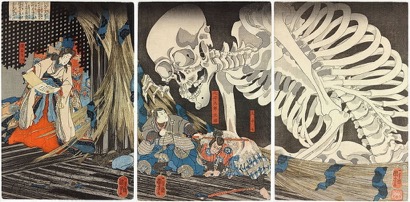
Utagawa Kuniyoshi: Takiyasha the Witch and the Skeleton Spectre (circa 1844)
"Assets to assets, dust to dust."
Most possessions more possess their owner than are possessed by any owner. Possession might remain nine-tenths of the law, but it buys little, though it does occupy space. The more possessions one has, the more space one needs to contain them, and the vast majority of that stuff just sits, never referenced, never touched. My folks' place, the house within which I grew up, eventually became a museum dedicated simply to containing an amazing inventory of long-unused stuff. In their final few years, neither my mom nor my dad could get to either the basement or the second floor, so those parts of the place, fully two-thirds of it, simply collected dust. After my dad died and my mom finally begrudgingly accepted the necessity of moving into an assisted living facility, the family quickly cleared out the place we'd long-imaged a repository of long-forgotten treasures. We found a few treasures, but we mostly uncovered tombs to long-ago summers. A set of long-illegal lethal lawn darts. Canned plums from the summer of 1965, still apparently good after more than forty years spent on a shelf in a far back corner of the basement. Most of the imagined treasures had turned to Sh!t by the time we started exorcizing them along with their demons.
That's the thing about possessions, they need to maintain at least a modest velocity or they inevitably degrade.
Heading

Elihu Vedder: The Questioner of the Sphinx (1863)
"One must drag a past into their dreams or they never have a chance of coming true."
If someone was manning the helm on this heap and I was its captain, I might feel moved to command that a course for home be set. "Give me the heading for home," I'd bark, and we we'd be on our way. Nobody's at the helm of this heap, though. The Muse and I do what we can, but neither of us have ever shown any particular penchant for navigation. Vectoring chased me off. Too much complicated math. The Muse almost exclusively employs persistence. She tends to get wherever she's going, but rarely by any expedient course. Her path meanders and leverages happenstance, and she'd very likely have it no other way. We're not really into efficiency here, but into collecting the stories our adventures are likely to tell us. The less predictable, the better.
We've gone and done it now, as my mother once might have derisively said.



